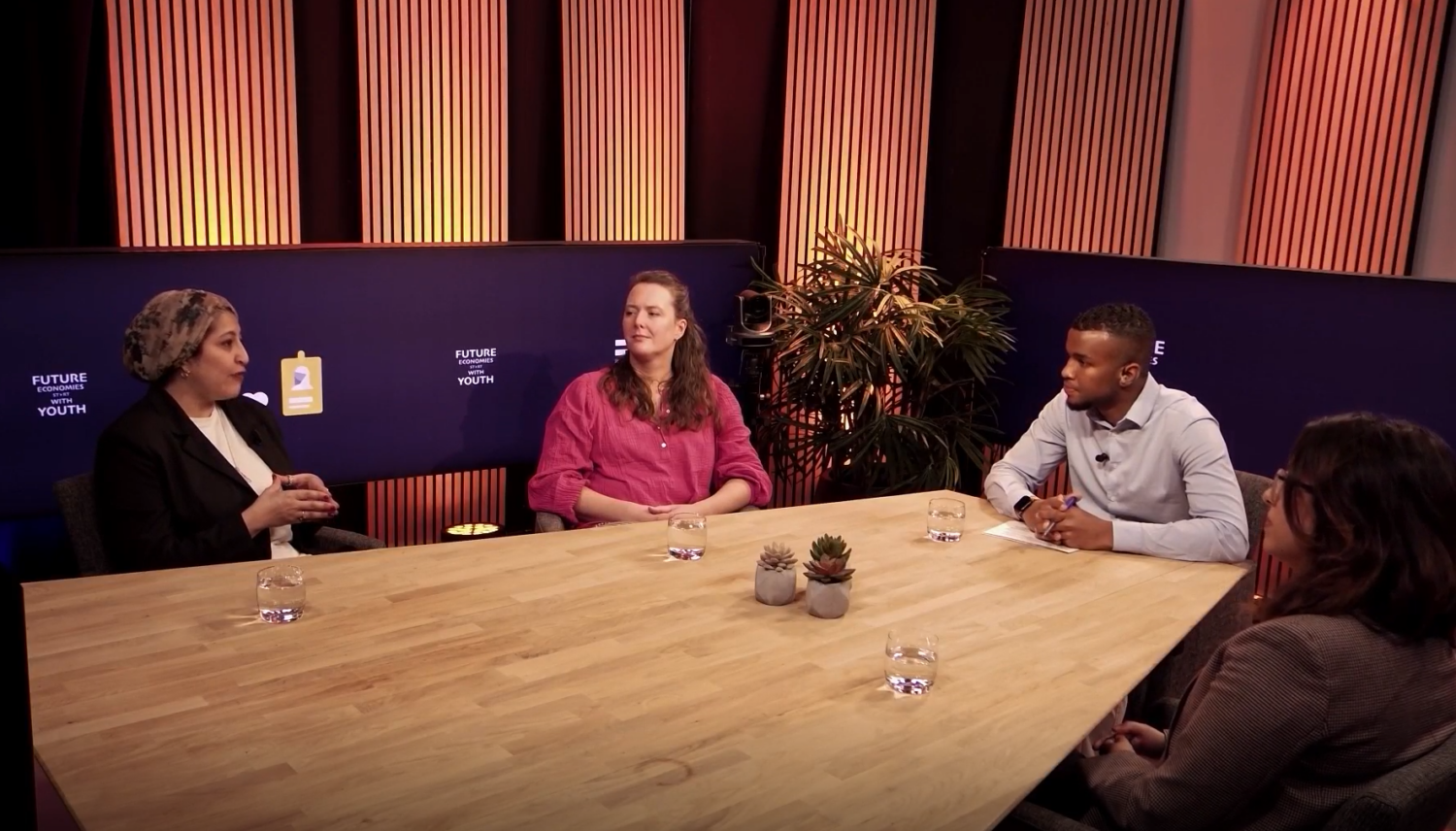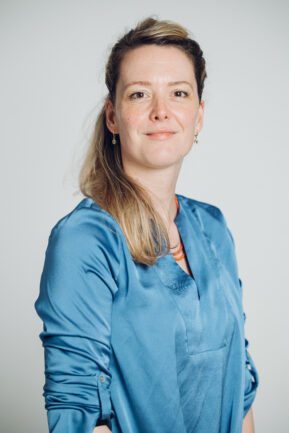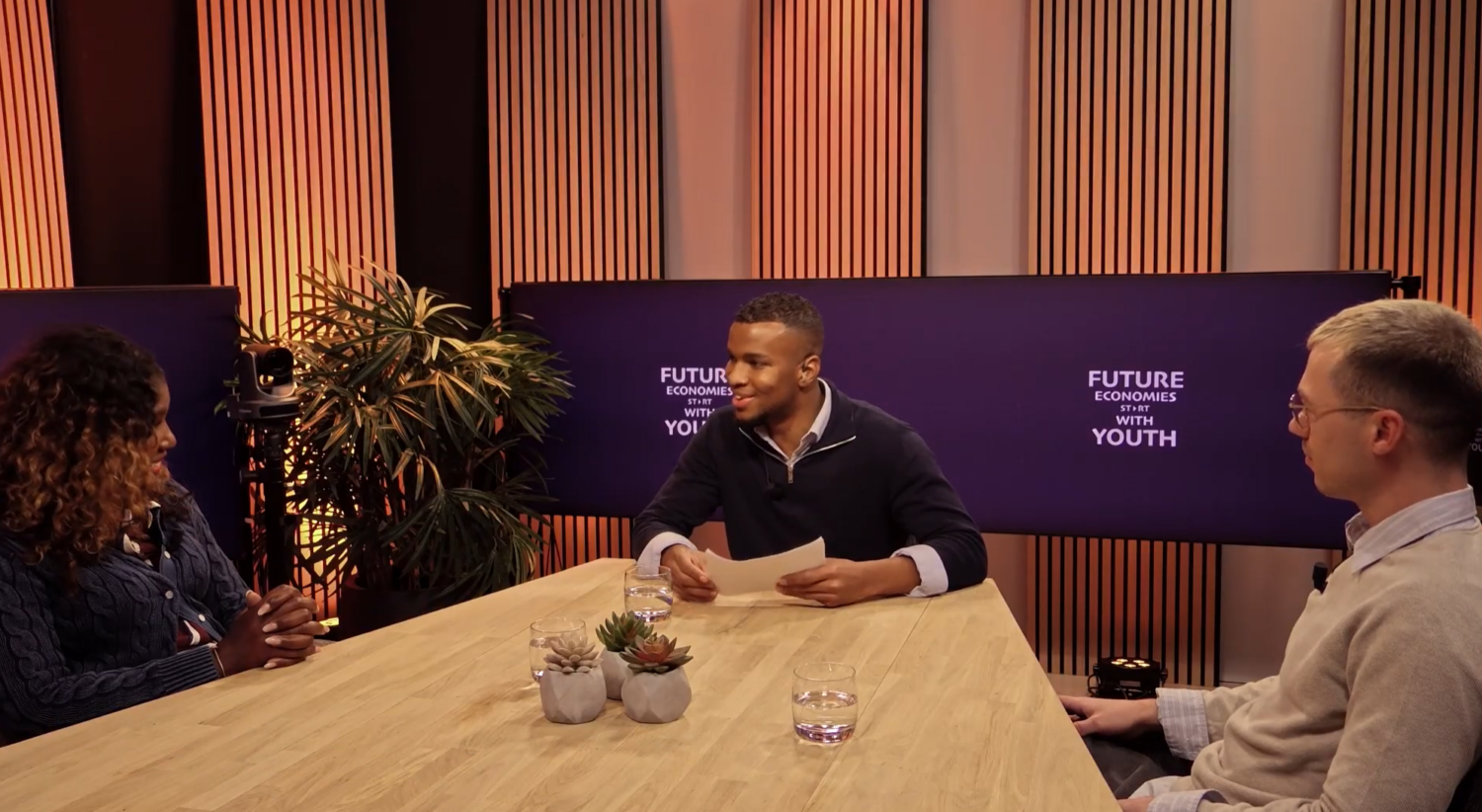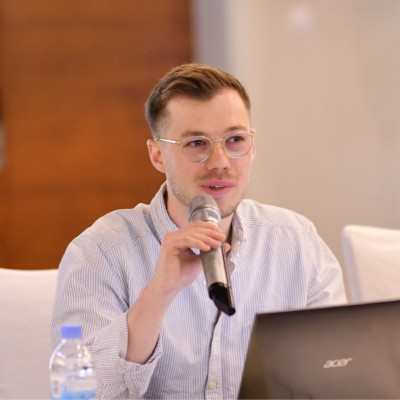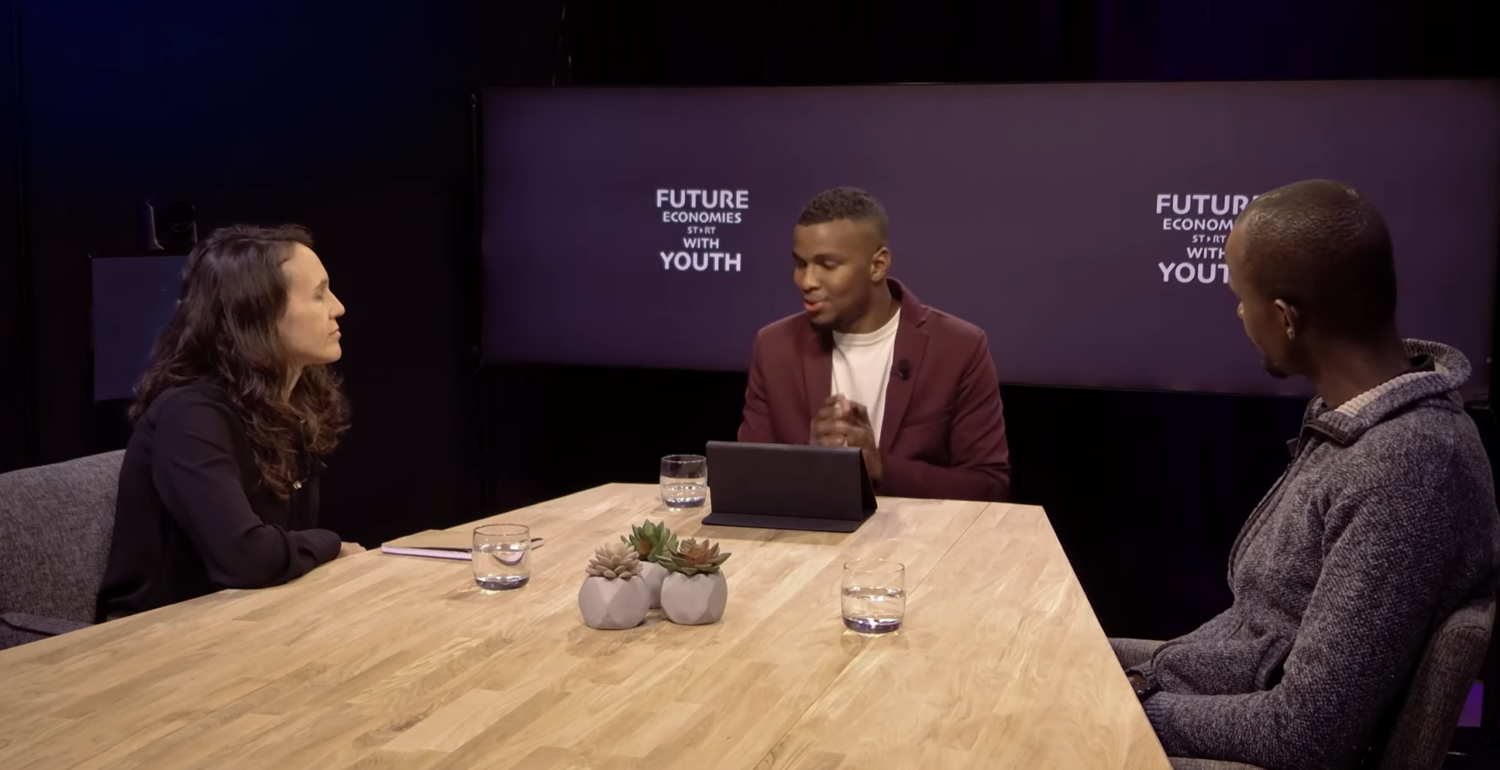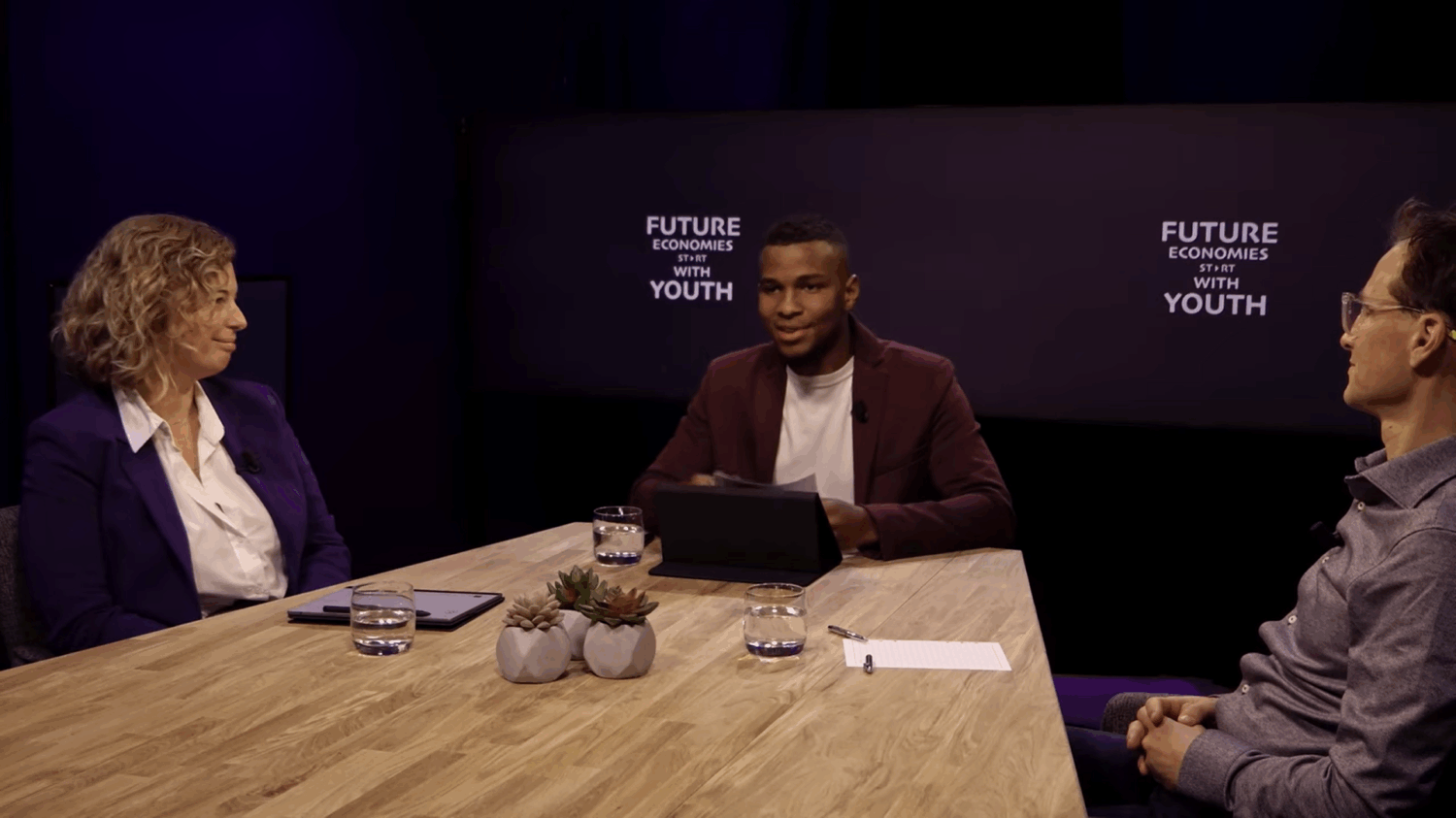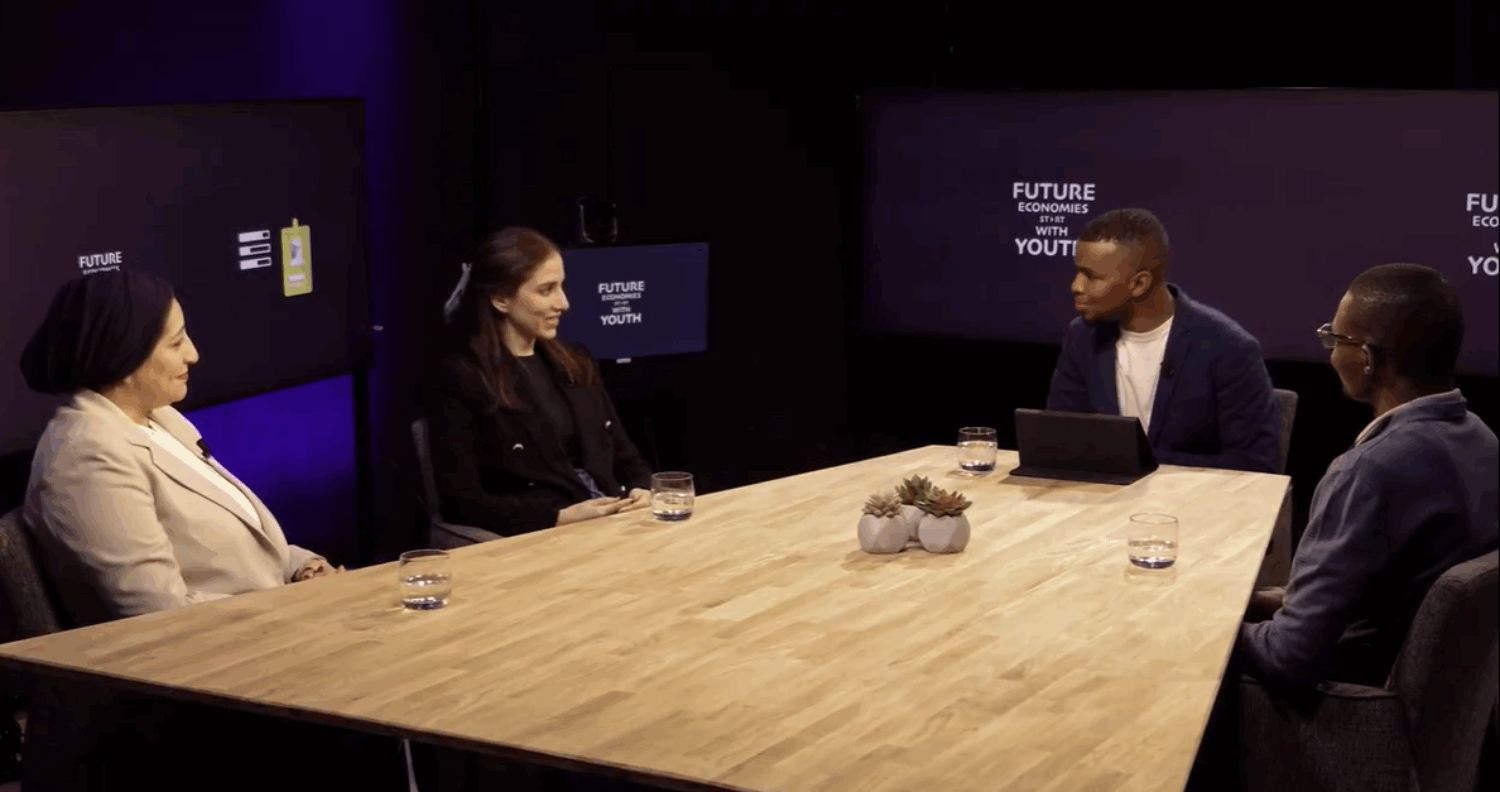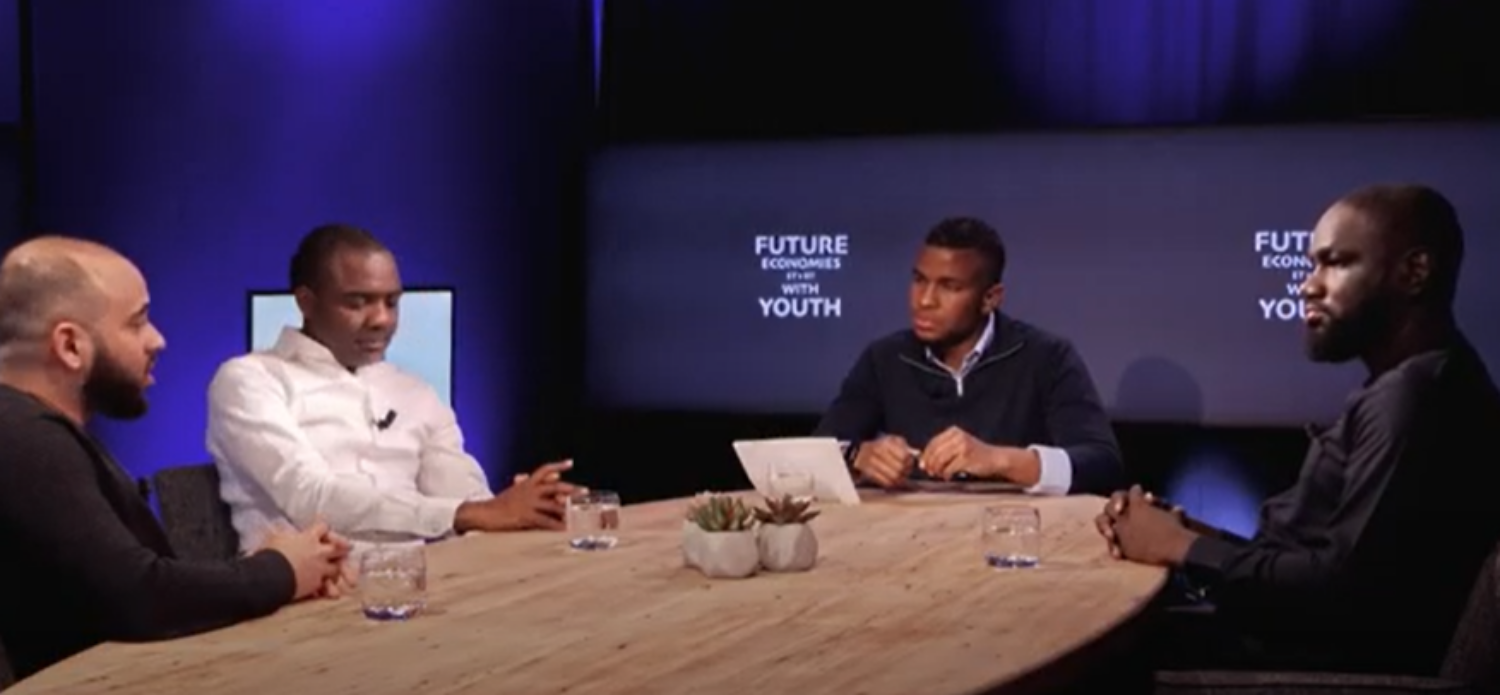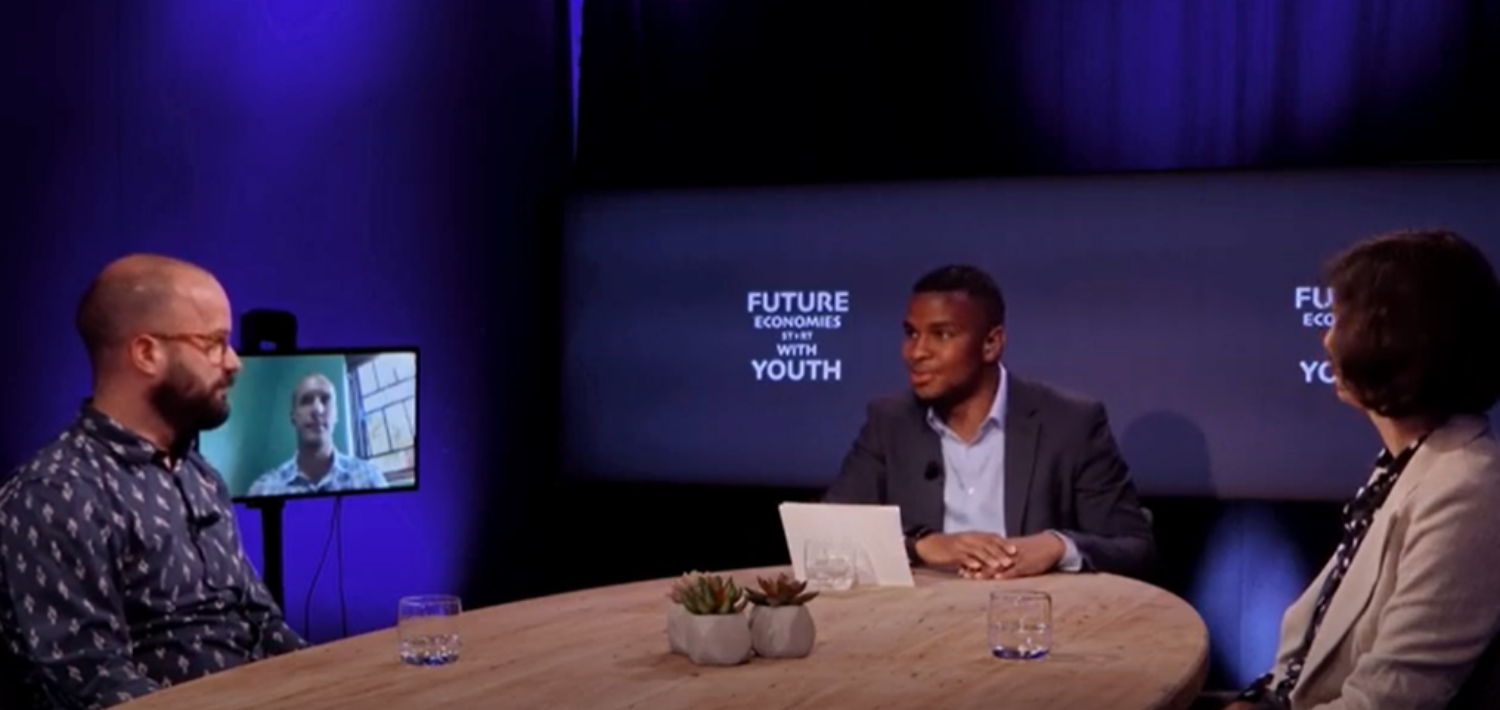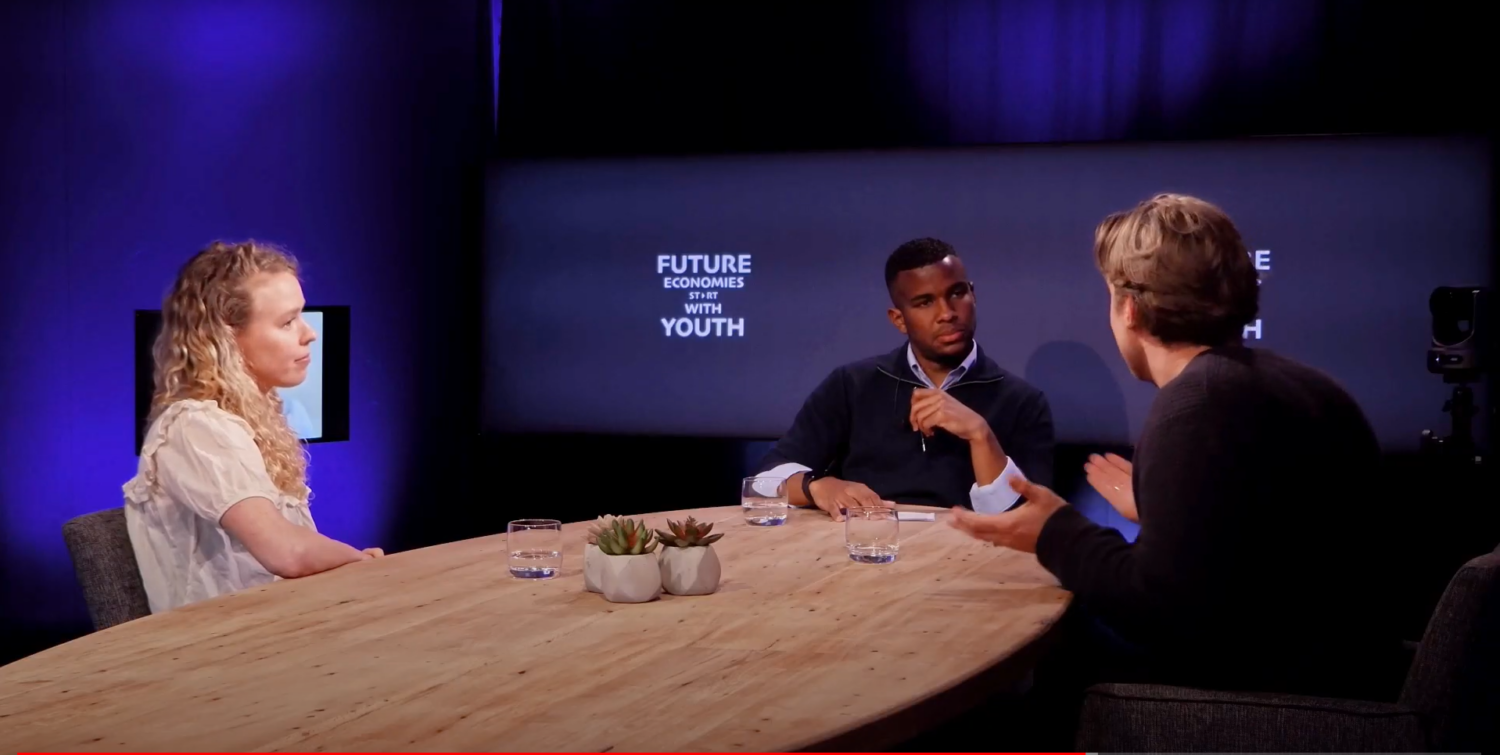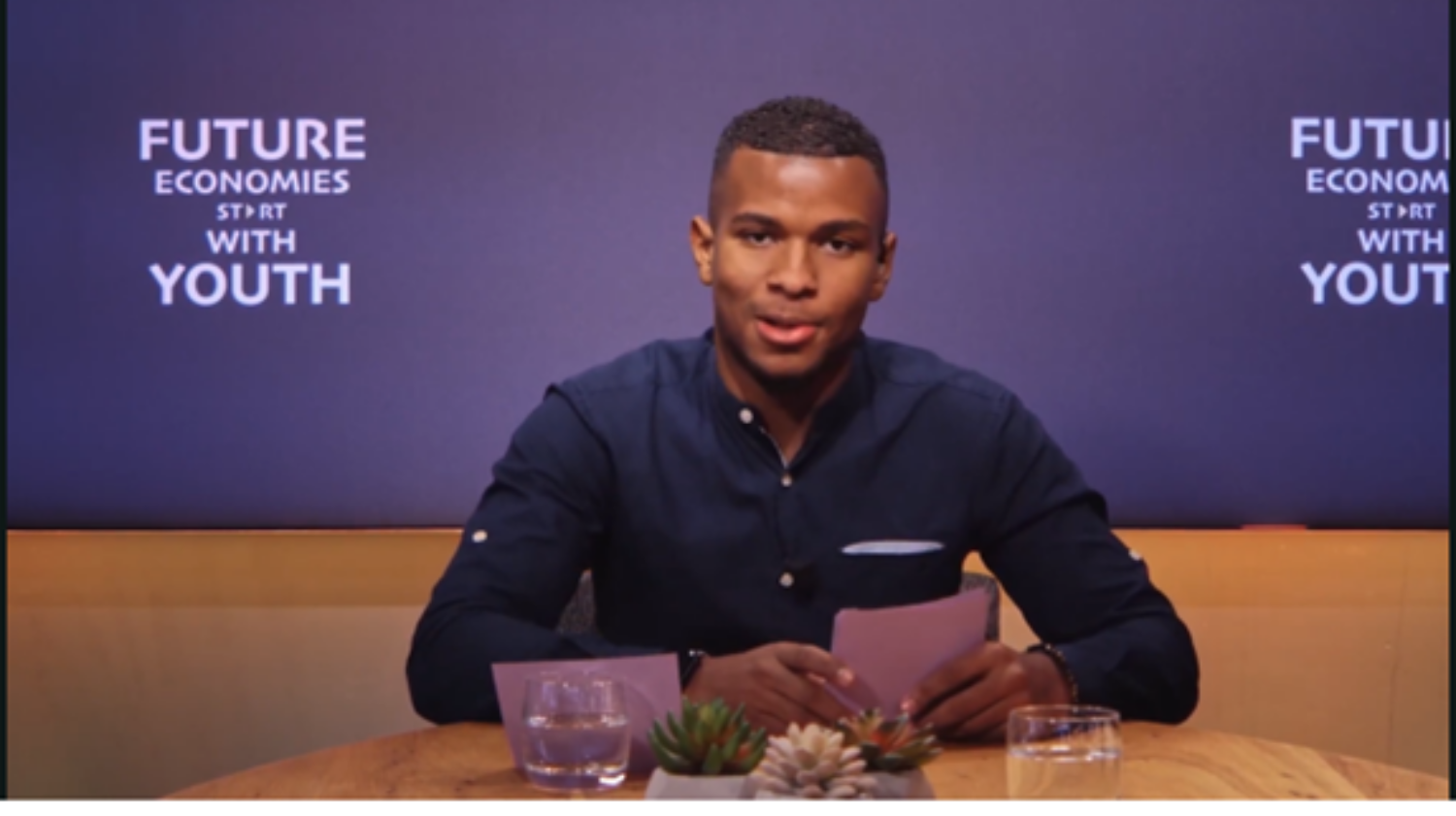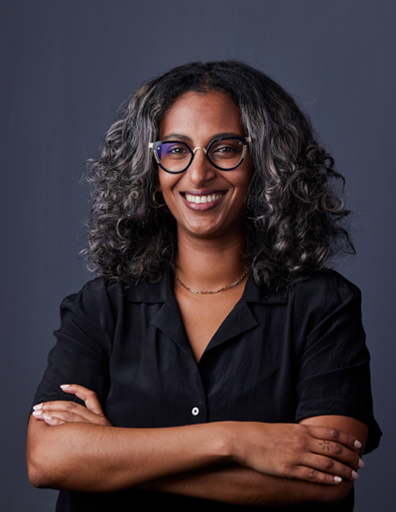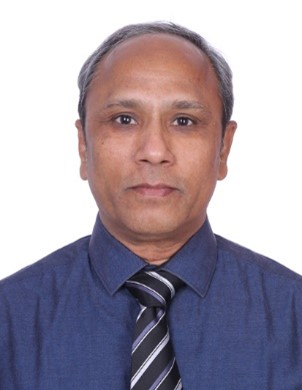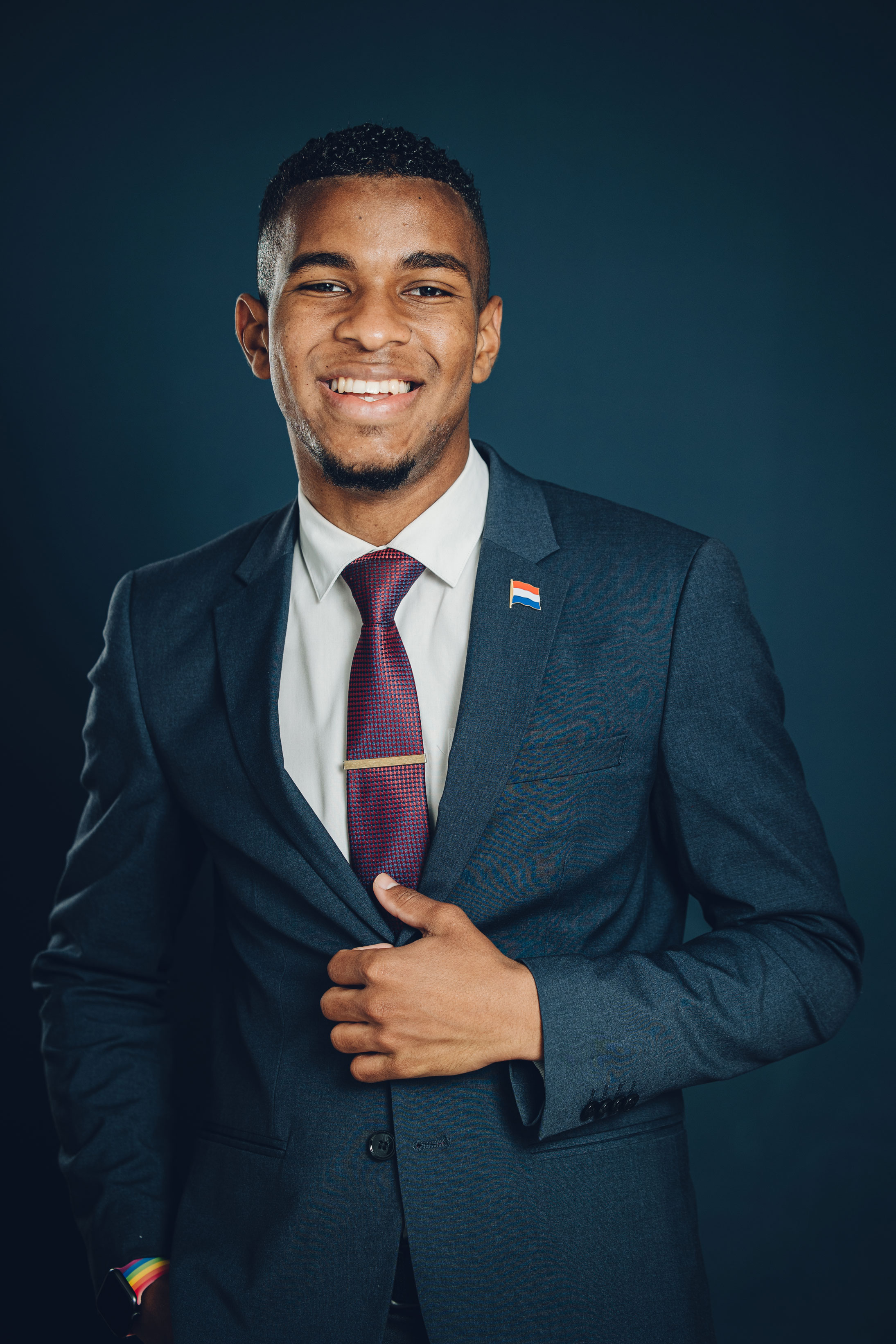The Podcast
To imagine a youth-centered future of work and set out practical steps to achieve it, we need to bring different voices together: the youth, the private sector, and civil societies.
Latest episode:
Episode 20
Mind the Gap: Gender Inequality in Digital Jobs in the MENA Region
“If females participate in the same percentage of males, then you will be able to grow the GDP in the MENA region by $2.7 trillion. So if you don’t take that opportunity, that is very big potential that you’re leaving on the table.”
Ola Farrag – CFYE Country Lead Egypt
Gender equality and inclusion in employment are essential – not only as a matter of fairness, but also as a powerful catalyst for innovation, creativity, and economic growth. However, research shows that the MENA region still ranks lowest globally in female labour participation, with only 25% of women in the workforce compared to the global average of 47%. Add youth unemployment at over 30%, and the urgency – and opportunity – for change is clear. Digital jobs, from e-commerce and online marketing to coding and data services, could unlock this potential and transform lives, businesses, and economies.
In this episode, Kevin is joined by Ola Farrag, CFYE Country Lead in Egypt; Safa Omrani, Operations and Communications Manager at New Silk Roads; and Marlou Rijk, former CFYE Technical Assistance and Learning Manager and now with MDF. Together, they unpack the gender gap in digital employment across the MENA region. The conversation dives into how targeted initiatives can help close this divide – and how digital jobs can open powerful new pathways for young women to access meaningful work, build skills, and shape the future of their communities, while driving positive change for the wider economy.
The speakers
Ola Farrag
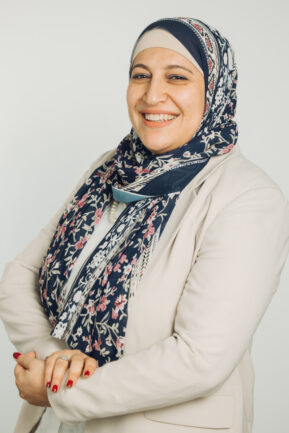
Mrs. Ola Farrag, the Egypt Country Lead for CFYE, brings over 20 years of experience in relief and development, specialising in Middle Eastern socio-economic dynamics. As an AUC graduate, she played a role in Egypt’s pivotal economic reforms of the 2000s and is a seasoned consultant in child protection, youth, and women’s empowerment. Known for her leadership and mentorship, she led a project that earned the 2015 WISE Award from the Qatar Foundation.
Marlou Rijk
Marlou Rijk is a Private Sector Development expert with over 10 years of dynamic experience managing, advising and evaluating entrepreneurship driven programmes and organisations in Africa and the Middle-East. She’s currently active as consultant & evaluator at MDF, and until late 2025 as Technical Assistance and Learning Manager at Palladium’s Challenge Fund for Youth Employment. She’s a strong analyst that thrives on making business models and impact programs produce their desired impact.
Safa Omrani
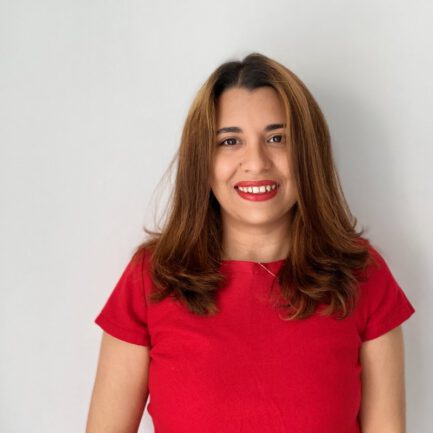
Safa Omrani is the Operations and Communication Manager at New Silk Roads, where she works at the intersection of research, digital innovation, and community development across the MENA region. She has contributed to regional studies and strategic initiatives exploring digital work, entrepreneurship, and emerging economic opportunities. Her work combines analytical insight with thoughtful communication to translate complex research into accessible and impactful narratives.
Episode 19
Partnerships That Deliver: Catalysing Youth Employment in the Green Economy
“I believe in the markets. I think that the private sector is the drive to change. And when you combine things with what the youth and what the market needs and wants – I see it very positively.”
Núria Soares – NABC
Dealing with the negative consequences of climate change and creating a large number of jobs for a growing population are two of the major challenges facing the African continent. The transition to a green economy can help tackle both simultaneously. This transition is twofold, along the lines of adaptation and mitigation. On the one hand, it involves making African economies more resilient to the effects of climate change. On the other, it requires investments in renewable energy and more sustainable production processes, in order to reduce Africa’s own emissions. Both tracks of the green transition require not only large-scale investments and capital allocation, but also labour. Green jobs, therefore, are essential to make it work.
In this episode, INCLUDE Knowledge Platform, CFYE’s Implementing Partner, ThriveAgric, and NABC unpack key insights from the CFYE-INCLUDE three-year research partnership, exploring how green and digital transitions can drive inclusive, youth-led employment across the continent. The conversation highlights what’s working, what’s holding youth back, and what’s needed to scale decent work, especially for young women.
The speakers
Núria Vlonk-Cunha Soares
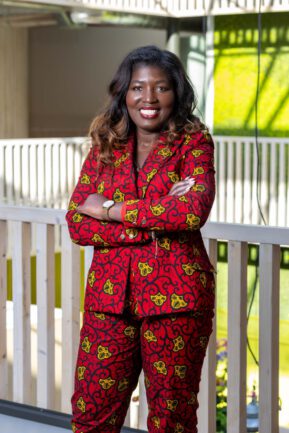
Núria holds a Bachelor in International Business and Languages from the Rotterdam Business School together with Evofenedex, as well as a Master in International Development Studies from Wageningen University. She joined NABC in 2021 and has since been responsible for the NABC Community, NABC’s flagship conference Africa Works! and oversees the Africa Insight Desk, which provides both Dutch and African companies with market intelligence services. In 2025, she became the Managing Director of the NABC.
Joscha Betke
At INCLUDE, Joscha co-designs and facilitates multi-country research and learning programmes focused on youth employment, just food systems, and social-ecological transitions across Africa. At the intersection of research, practice and policy create publications, activate multi-stakeholder networks, and translate research insights into actionable strategies.
Samirah Bello
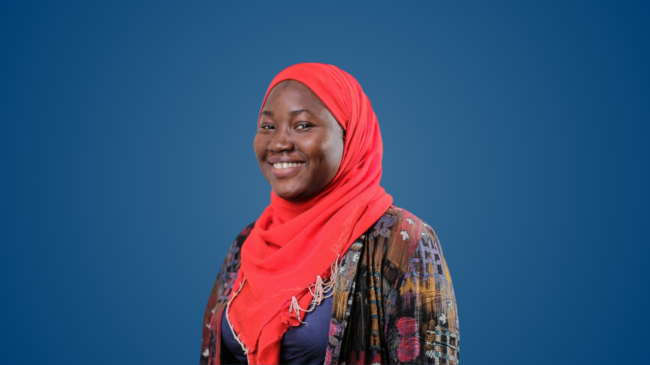
Samirah is a management and business professional with over five years of experience in the agribusiness space and eight years of experience in the community development space. She currently leads partnerships at ThriveAgric. She focuses on ensuring the entire agricultural value chain across various African countries has access to operations and financial needs and creates sustainable impact using the SDG lens. Her work has also enabled hundreds of thousands of smallholder farmers to gain access to finance and technology, as well as improve productivity, by connecting them with amazing national and international stakeholders.
Episode 18
Skillset to Job Market: The Upskilling Pathway for Youth Employment
“As a funder, we’re working with over 100 partners across many different countries and contexts, and we’re looking for trends and patterns about what works and what doesn’t work and why.”
Emily Waters – CFYE
In today’s rapidly evolving job market, education alone is no longer enough. A 2022 UNICEF report revealed that nearly 75% of young people aged 15-24 in 92 countries lack the critical skills needed for modern employment. So, how do we bridge this growing gap?
In this episode, our host Kevin, sits down with Paul Njuguna, CFYE’s Senior Portfolio Associate for Kenya, to explore the impact of the skills mismatch on young people and economic growth, particularly in Kenya, while highlighting key partners in CFYE’s Kenyan portfolio that help bridge this gap. Emily Waters, CFYE’s MEL Manager, discusses how data-driven, youth-centered training programs are transforming lives by aligning skills with market demands. She dives into the role of gender, accessibility, and feedback loops in shaping effective programs, with real-world examples of how listening to young people—especially marginalized groups—leads to meaningful change. From VR welding in Kenya to innovative hospitality training in Egypt, this episode highlights practical solutions and success stories that are redefining how we prepare the next generation for the workforce.
The speakers
Paul Njuguna
Paul is a private sector development specialist with over 7 years of implementing entrepreneurship-centric projects. He has supported private sector enterprises and individual entrepreneurs to achieve their business goals through different interventions, including robust business development services using different capacity-building methodologies. Broadly, the focus of his expertise ranges from employment generation, skills development, start-up business support, access to finance, demand aggregation, and digital inclusion through robust partnership engagement with the business member organizations, and private and public sectors. He is currently CFYE’s Senior Portfolio Associate for Kenya.
Emily Waters
Emily is an impact measurement and monitoring and evaluation (M&E) expert, as well as research professional, with over 15 years of experience on complex, multi-stakeholder international development and health programs. She is currently CFYE’s Monitoring, Evaluation, and Learning Manager.
Episode 17
Navigating Post-Conflict Development Interventions
“…from creating jobs for young people or helping strengthen agricultural communities and countries that are coming out of a conflict, to working on how government and state systems are organised to better enable a post conflict settlement, that’s where we get involved.”
Sinéad Magill – The Palladium Group
In this episode, our host Kevin Eustatia Palm is joined by Sinéad Magill, Co-CEO of The Palladium Group, and Dirk-Jan Koch, Director & Secretary of the Advisory Council of International Affairs of the Netherlands (AIV). Together, they explore the roles of development organizations and donor countries in fragile contexts, discussing the risks and opportunities in overcoming conflict and challenging the conventional definition of post-conflict period. The episode delves into the significance of post-conflict stabilisation programs and sustainable economic growth, and explores how private sector development can support lasting peace, highlighting the importance of implementing inclusive development agendas that prioritise the inclusion of local communities and young voices.
The speakers
Sinéad Magill
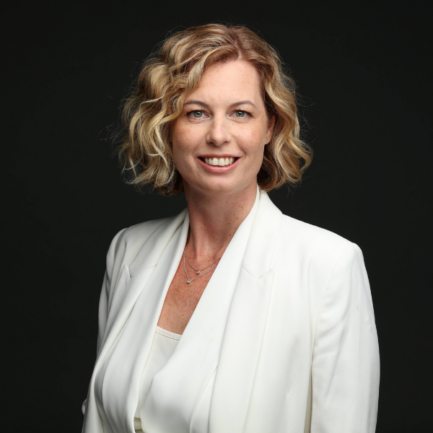
Sinéad leads Palladium’s UK, Europe and APAC businesses, delivering impact in more than 90 countries worldwide. Sinéad has 20 years’ experience leading positive impact programs, with projects spanning humanitarian response, governance reform, post conflict stabilisation, economic growth and social inclusion. She played a key role in the UK programming in Iraq and subsequently delivered programmes in Afghanistan, Palestine, Uganda and Syria, during which time she founded one of the UK’s leading stabilisation and recovery teams.
Sinéad was featured in Management Today’s 35 Under 35 and won the Women of the Future Business Award. She has a Bachelor of Arts Honors from Trinity College Dublin and a Master’s in International Development from the London School of Economics.
Dirk-Jan Koch
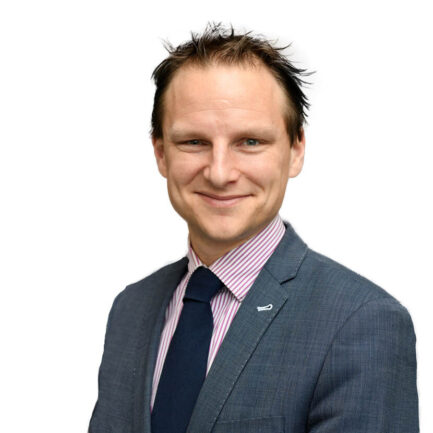
Dirk-Jan (1980) is director of the Advisory Council on International Affairs (AIV) of the Dutch government and parliament. He has been serving as the Chief Science Officer of the Netherlands Ministry of Foreign Affairs (2019-2023) and as its Special Envoy for Natural Resources (2014- 2018). He is Special Professor of International Trade & Development Cooperation. Dirk-Jan finished his PhD (cum laude) at the Radboud University in 2009 and focused on geographic choices of international development NGOs. He was based for 5 years in the DRC and 2 years in Kenya, where he worked amongst others as a regional director at Search for Common Ground, as a professor at the Catholic University of Kinshasa and as a diplomat of the Netherlands to the DRC. He wrote and published the book “Foreign Aid and its Unintended Consequences” in 2023.
Episode 16
Localising Impact – The CFYE Approach
“I would like to emphasize the potential of transformative change with the localised approach; it is very important that we listen to the people we aim to serve at the end of the day so we eventually come out with long term impactful solutions on the ground that will continue long after CFYE leaves”
Ola Farrag, CFYE
On Episode 16 of Future Economies Start with Youth – The Podcast, Kevin invites CFYE Country Leads, Ola Farrag, Lina Al Khawaja, and Andrew Magunda to discuss how localisation is reshaping international development and empowering communities to drive their own progress. We will hear about the importance of putting local voices and youth at the forefront, not only for creating relevant, impactful solutions, but for fostering resilience and long-term sustainability. In addition, Ola, Lina and Andrew will shine light to how CFYE’s tailored approach leverages local knowledge and partnerships to create lasting change for youth employment.
The speakers
Ola Farrag
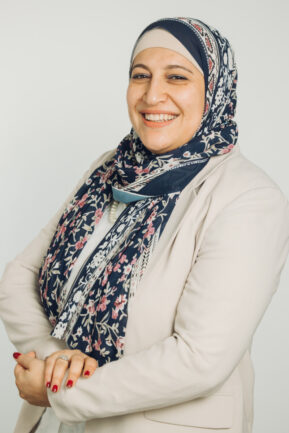
Mrs. Ola Farrag, the Egypt Country Lead for CFYE, brings over 20 years of experience in relief and development, specialising in Middle Eastern socio-economic dynamics. As an AUC graduate, she played a role in Egypt’s pivotal economic reforms of the 2000s and is a seasoned consultant in child protection, youth, and women’s empowerment. Known for her leadership and mentorship, she led a project that earned the 2015 WISE Award from the Qatar Foundation.
Andrew Magunda

Andrew Magunda is the Country Lead of CFYE in Uganda. With over 20 years of experience in Fund Management, Project Management, Strategy Development, M&E and Technical Assistance. He has served in the Global South and North in Focus Areas of Youth, Gender, Health, Education, Business & Enterprise, Financial Inclusion, Energy & Environment, Employability and Career Services. Andrew is a founder of two non-profits and sits on two Governance boards of other NGOs.
Lina Al Khawaja
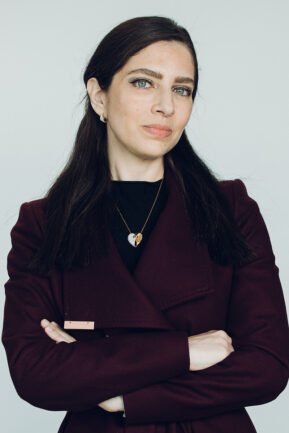
Lina is a seasoned Humanitarian and Development Projects Management Professional with extensive experience in leading impactful initiatives across the Middle East and Levant region. Currently serving as the Country Lead for Challenge Fund for Youth Employment in Jordan, Lina oversees strategic priorities, portfolio management, and the delivery of key projects to address youth employment challenges. With a strong background in grants management, she previously managed USAID’s Syria Essential Services (SES II) project, excelling in grant implementation, capacity building, and operational support. Her diverse experience spans development and humanitarian response programs, where she has provided managerial and technical expertise to create lasting impact. Holding a master’s degree in business administration, Lina combines her academic foundation with a deep understanding of regional complexities to drive sustainable solutions and foster a broad professional network.
Episode 15
Scaling Impact: Empowering African Youth through the Scalable Employment Model (SEM)
What we’re talking about here is the impact of co-creation, the impact of partnering, how the Dutch government along with sponsoring or supporting the Challenge Fund, working with Acumen as a partner […] There’s so much more that will come out of it, not just jobs but also decent jobs in the home countries in which we operate and essentially these are sustainable jobs as well. That’s the future of Africa, which is something that we all have close to our heart but also we know how important it is for the world.
Ahmed Darwish, CFYE
With 80 million African youths trapped in extreme poverty and a significant disparity between job seekers (10 to 12 million) and available opportunities (only 3 million), unemployment pressures are overwhelming. Various challenges exacerbate this situation, including skills gaps, gender disparities, and a heavy reliance on the informal economy, where work is often insecure and vulnerable. Faced with such large numbers of disenfranchised and unemployed youth, the need for scalable solutions becomes paramount.
In this episode, host Kevin Eustatia and guests Ahmed Darwish, Adekemi Ajayi, Bowofade Elegbede, and Osagie Azeta explore the Scalable Employment Model’s potential to reshape Africa’s economic landscape, diving into CFYE’s SEM Call and highlighting the impactful work of Acumen and initiatives like CropSafe.
The speakers
Ahmed Darwish
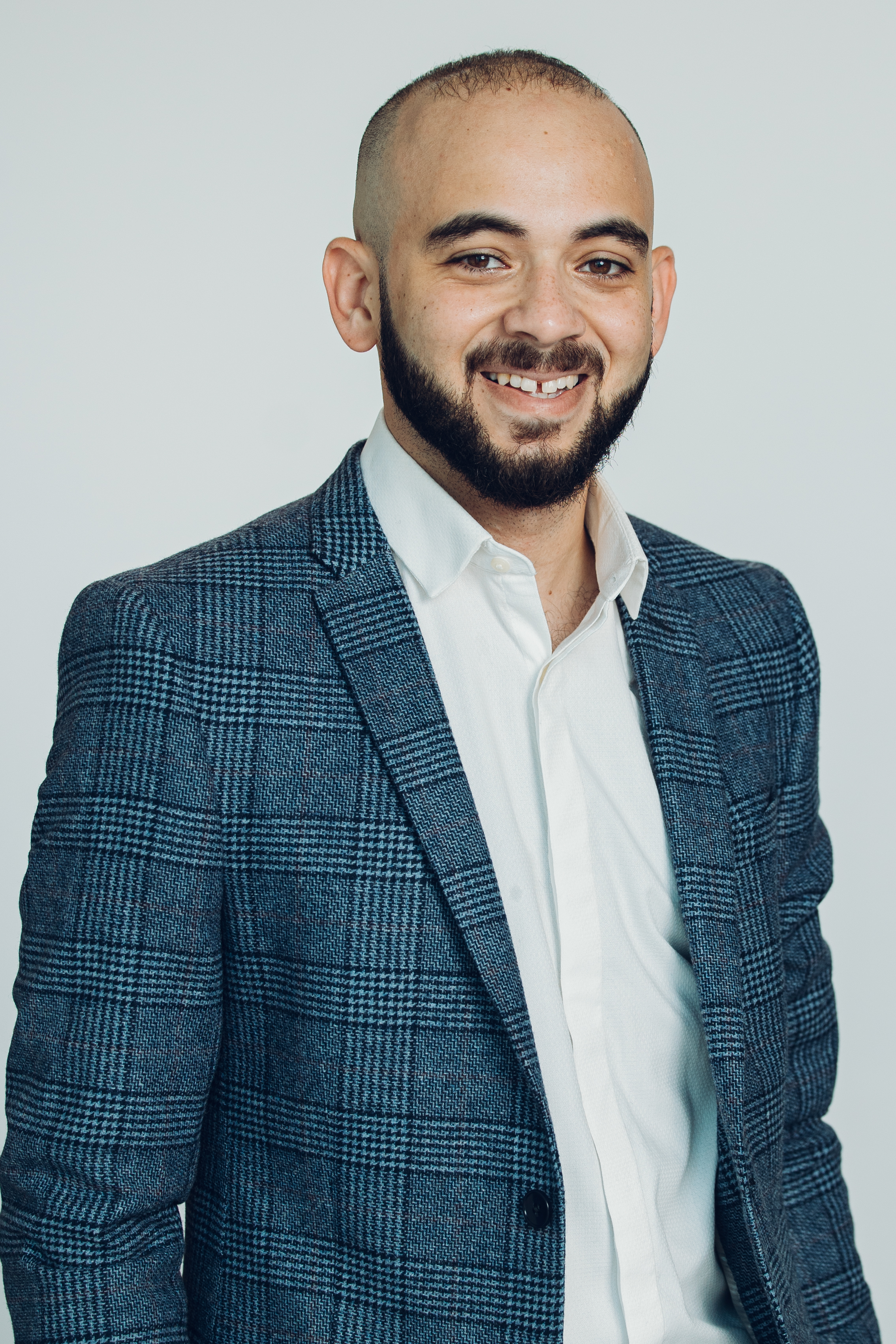
Ahmed is a Marketing and Innovation Management professional with vast entrepreneurial expertise and more than 14 years’ experience working with local and international entities in multiple sectors and countries. He enjoys sharing his experience through engaging with various actors in the private sector, with a particular focus on supporting the start-up entrepreneurship ecosystem. Now responsible for supporting CFYE’s Implementing Partners from Sudan as well as the Scale Employment Model (SEM) Challenge Call, and closely collaborating with Technical Assistance, Strategy & Impact, and Learning & Innovation teams to support cross-cutting learning initiatives, his aim is to capitalize on the diversified knowledge and skills gained to build upon and extend those experiences to continue learning and sharing his knowledge and expertise, to ultimately support, catalyse, and scale up responsible and sustainable innovations towards social impact.
Adekemi Ajayi

Adekemi’s breadth of experience in finance, strategy, and consulting spans over 25 years from various senior and executive management roles in Finance, Strategic Advisory, Investment Banking and Corporate Restructuring. Her strengths derive from combining leadership, knowledge, strategic thinking, and a hands-on approach to problem-solving in companies across sectors including telecommunications, asset management, a regional conglomerate, investment banking and advisory services. Adekemi was educated in Nigeria and the United Kingdom. She graduated from Imperial College, University of London with an Upper Second in Biochemistry and is a UK-qualified Chartered Management Accountant (ACMA) as well as a Chartered Global Management Accountant (CGMA). Adekemi’s early professional career was forged in the United Kingdom with Exxon Mobil, where she trained as an accountant and Morgan Stanley, where she worked in investment management and managed foreign exchange risk. In Nigeria, she gained further invaluable experience working in senior and executive management positions at UNIC Asset Management, Etisalat, and Chapel Hill Denham. Prior to joining Acumen, Adekemi had a stint at Odu’a Investment Company Limited as the Group Chief Financial Officer, reorganizing and restructuring the finance function of the holding company and its subsidiaries. Adekemi is enthusiastic about applying her wealth of knowledge and experience towards addressing issues of development, poverty and inclusiveness. Outside of work, she is an avid Formula 1 and tennis fan as well as an art enthusiast.
Bowofade Elegbede
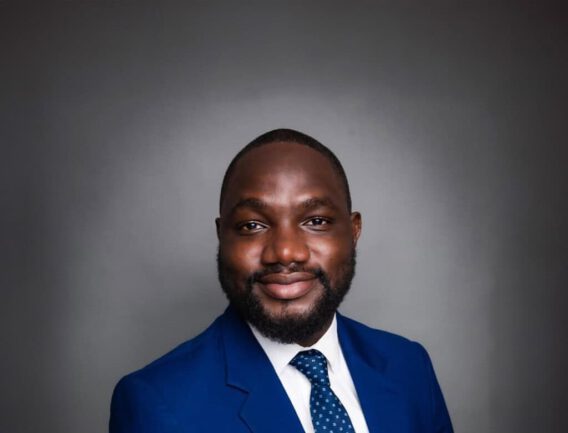
Bowofade’s background spans over 9 years of experience working in tax consulting, corporate strategy, corporate finance, financial advisory, and early-stage investing. Previously, at Platform Capital, Bowofade spearheaded principal investments and successfully led equity transactions in technology and industrial companies. He managed a diverse portfolio of more than 60 companies, both directly and indirectly through limited partner investments in venture capital funds across Nigeria, the USA, and Mexico. Bowofade also played a key role in Platform Capital’s incubation program, overseeing the screening, selection, onboarding, and management of three cohorts across multiple African countries. Before his tenure at Platform Capital, Bowofade worked in the strategy team at Asset and Resource Management Holding (ARM), focusing on corporate development initiatives and strategy formulation. He worked on coordinating sell-side activities for two divestment transactions from ARM’s subsidiaries in the insurance and pension segments, supported the concept development of ARM’s proposed social impact investments fund and was involved in ARM’s acquisition of Mixta where he worked on post-transaction business combination and integration strategies for the combined entities. Bowofade began his career at Deloitte, specializing in tax and consulting. He holds a degree in Accounting from Bowen University, Nigeria, a master’s degree in E-business from Lancaster University, UK, and is currently a CFA Level II candidate. In his spare time, he enjoys playing football and curating Nigerian music.
Osagie Azeta
.jpeg)
Osagie is the co-founder of CropSafe, dedicated to improving the cereal value chain in Nigeria by offering grains of the highest quality to buyers in the local and international market.
Episode 14
From Grants to Growth: Building Investment-Ready Social Businesses
It can be really hard to adapt, grow, and innovate purely with grant funding. It’s essential when you start out but a transition needs to happen and CFYE is a great bridge for that, because they actually fund our core impact. It’s been really helpful having a funder like them because we don’t have to divert our sustainable model in any way.
Andy Bownds, EcoBrix
In episode 14, our host Kevin Eustatia and guests Niek van Dijk (CFYE), Andy Bownds (EcoBrix), and Anouk Verheijen (FMO) explored the world of social impact and financial sustainability through the lens of investment readiness.
Together, they uncovered the challenges and opportunities faced by social businesses in attracting investment to amplify their impact. From navigating grant funding to leveraging innovative financial structures, they share invaluable strategies and insights that can propel social enterprises to enhanced financial sustainability and greater societal impact.
Their advice to blossoming social entrepreneurs? Do your homework, set realistic targets, and stick to a core mission, while ensuring policies and governance align with that mission.
The speakers
Anouk Verheijen
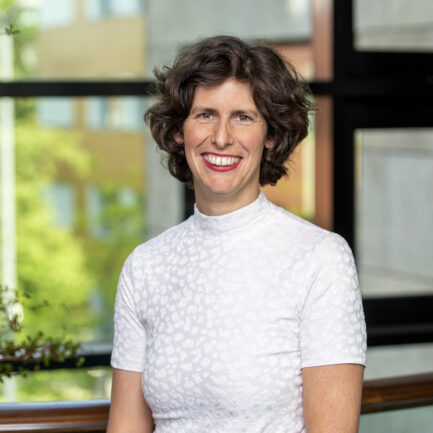
Anouk is the Senior Programmatic Technical Assistance Officer at the Dutch Entrepreneurial Development Bank (FMO). In this capacity, she designs and implement large scale Technical Assistance Facilities supporting FMOs impact objectives including creating decent jobs (SDG8), reducing inequality (SDG10) and promoting climate action (SDG13). Previously to starting with FMO she worked as a consultant supporting SME development in developing countries for over 15 years, with a specific focus on promoting access to finance for SMEs operating in the green growth space.
Niek van Dijk
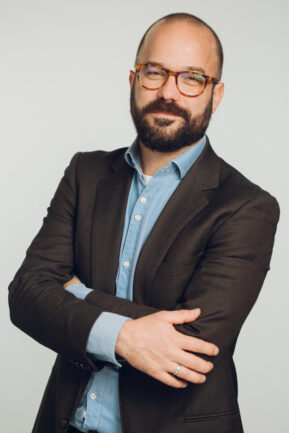
Niek is an experienced project lead with over 15 years of experience developing, acquiring and implementing projects leading to growth opportunities for African entrepreneurs. At the Challenge Fund for Youth Employment, Niek is Senior Technical Assistance Manager, responsible for advising CFYE Implementing Partners on aspects related to Scaling and Investment Readiness and to Job Quality.
Andy Bownds
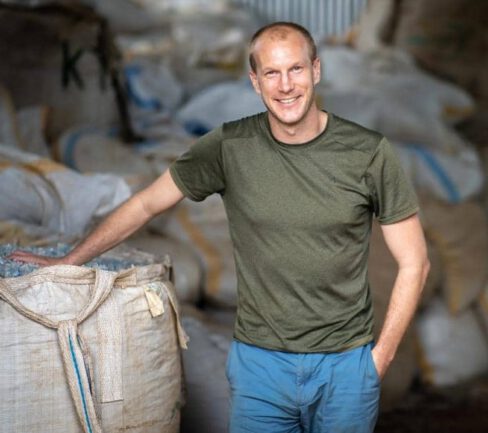
Andy is the Co-Founder & CEO of Eco Brixs. He has worked in the entrepreneurial space in East Africa for the past decade having built 3 businesses the latter of which is Eco Brixs. With a passion for sustainable green job creation, Andy has been successful in fundraising across investment, grants, loans, and blended finance models.
Episode 13
Waste workers or Climate Champions? Green jobs for youth in Africa’s plastic recycling sector
People who work in the waste sector need formalisation, and to be able to formalise they need to be able to form groups and associations and we need to adopt a multifront approach. The government cannot do it alone. The private sector cannot do it alone. Donors and other actors cannot do it alone. We need collaboration between all stakeholders.
Brian Sagala, Taka Taka Solutions
In episode 13, our host Kevin Eustatia Palm facilitated an insightful discussion on the potential of the plastic waste recycling sector to create green jobs for youth.
Drawing upon the insights of the collaborative research conducted by The Include Knowledge Platform and CFYE, the speakers Camee van Knippenberg (CFYE) , Brian Sagala (TakaTaka Solutions) and Rikke van der Veen (The Include Knowledge Platform) explored the topic respectively from a youth, business, and research perspective. Their discussions delved into the possibilities that this sector has to create green jobs and empower new generations of climate champions, while touching upon the current challenges to a sector-wide job improvement and formalisation.
Their conclusion? Effective change hinges on a collaborative approach involving government, businesses, and workers.
The speakers
Rikke Van der Veen
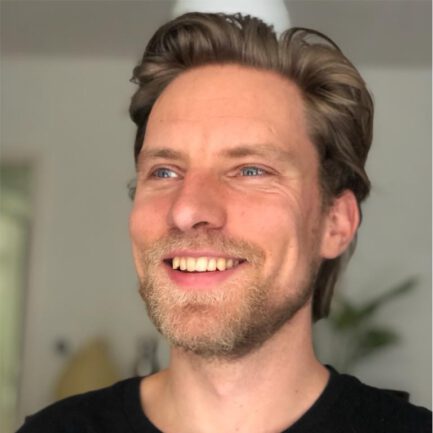
Rikke van der Veen serves as a knowledge manager at the INCLUDE platform. His expertise encompasses action-focused research and decent youth employment and participation. He participated in the second phase of the research partnership between INCLUDE and CFYE exploring green jobs for African youth in the Waste Recycling sector.
Camee van Knippenberg

Camee works in the Results, Data and Impact Team of the Challenge Fund for Youth Employment as a Senior MEL Associate. She enjoys using data to gather insights and sharing the understanding collected to continuously improve performance. Camee is passionate about sustainability and is convinced that green jobs are the future. Camee leads the Challenge Fund for Youth Employment’s learning agenda on ‘The Future of Work’ is green.
Brian Sagala
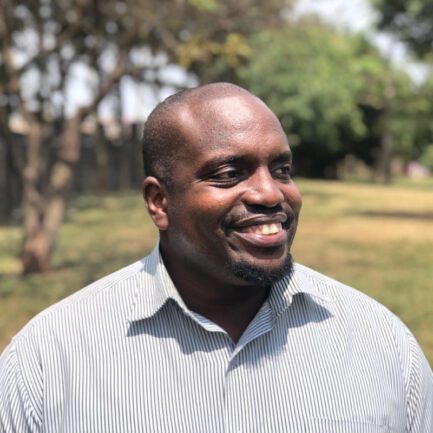
Brian Sagala is the head of Marketing & Communications at the largest waste management and recycling company in Kenya: TakaTaka Solutions. Through a vertically integrated model of collecting, sorting, composting and recycling, TakaTaka Solutions recycles up to 95% of the 90 tonnes of waste they collect daily. They currently have employed over 700 employees and worked with over 3,000 waste pickers in 2023. Brian holds a Bachelor’s degree in science and a Master’s degree in communication. When he is not talking about recycling and saving the planet, Brian is a sports fanatic and a family man.
Episode 12
Equity Through Entrepreneurship: Bridging Gaps in Decent Work
In episode 12, “Equity Through Entrepreneurship,” of Future Economies Start withYouth – The Podcast, host Kevin Eustatia takes a deep dive into entrepreneurship and how it can pave the way for equitable access to decent work. Featuring insights from CFYE Country Leads for Morocco Farah Fawzi and Senegal, Aminata Diouf, the discussion uncovers the complexities of gender disparities within the informal sector and the strides being made towards inclusivity.
Furthermore, an enlightening interview with Fatou Diop, founder of Calinounou, sheds light on the transformative potential of entrepreneurial ventures, particularly in formalizing the home-care industry. Amidst challenges like informality and skill gaps, entrepreneurship offers a beacon of hope for youth employment.
Through a multilateral approach involving government, private sector, and educational institutions, the episode envisions a future where entrepreneurship thrives as a catalyst for equitable and sustainable employment. Join us as we explore the dynamic intersection of entrepreneurship, youth empowerment, and equity, envisioning a future where opportunity knows no bounds.
The speakers
Aminata Diouf
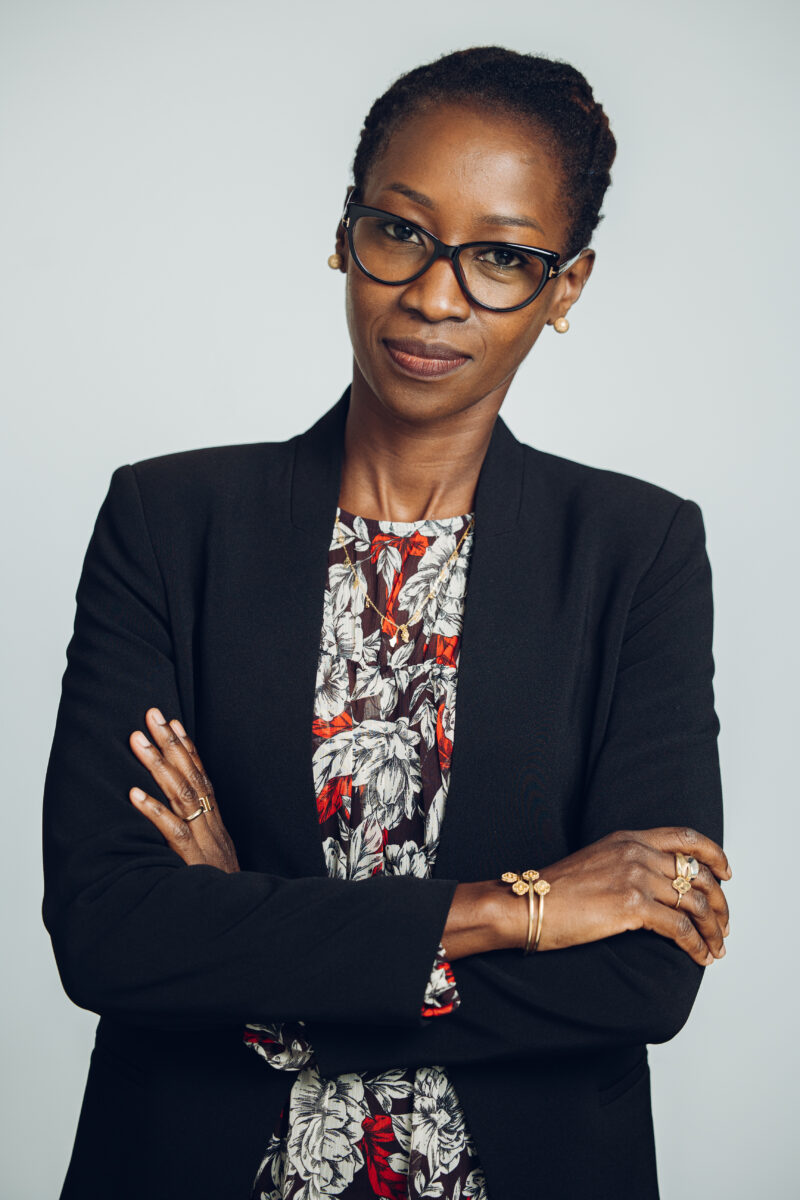
Aminata Diouf, a visionary leader in Senegal, champions youth and women empowerment with over eight years of impactful leadership. With a background in economics and finance, she spearheaded transformative projects at the Ouagadougou Partnership before becoming the Country Lead for the Challenge Fund for Youth Employment in 2022. Her innovative approach bridges skills development with job market demands, empowering countless young individuals. Aminata fosters inclusivity and embraces diversity, forging strategic partnerships to maximize impact. Committed to sustainable change, she continues to drive economic opportunities, ensuring a brighter future for Senegal’s youth and women, while inspiring beyond borders.
Farah Fawzi
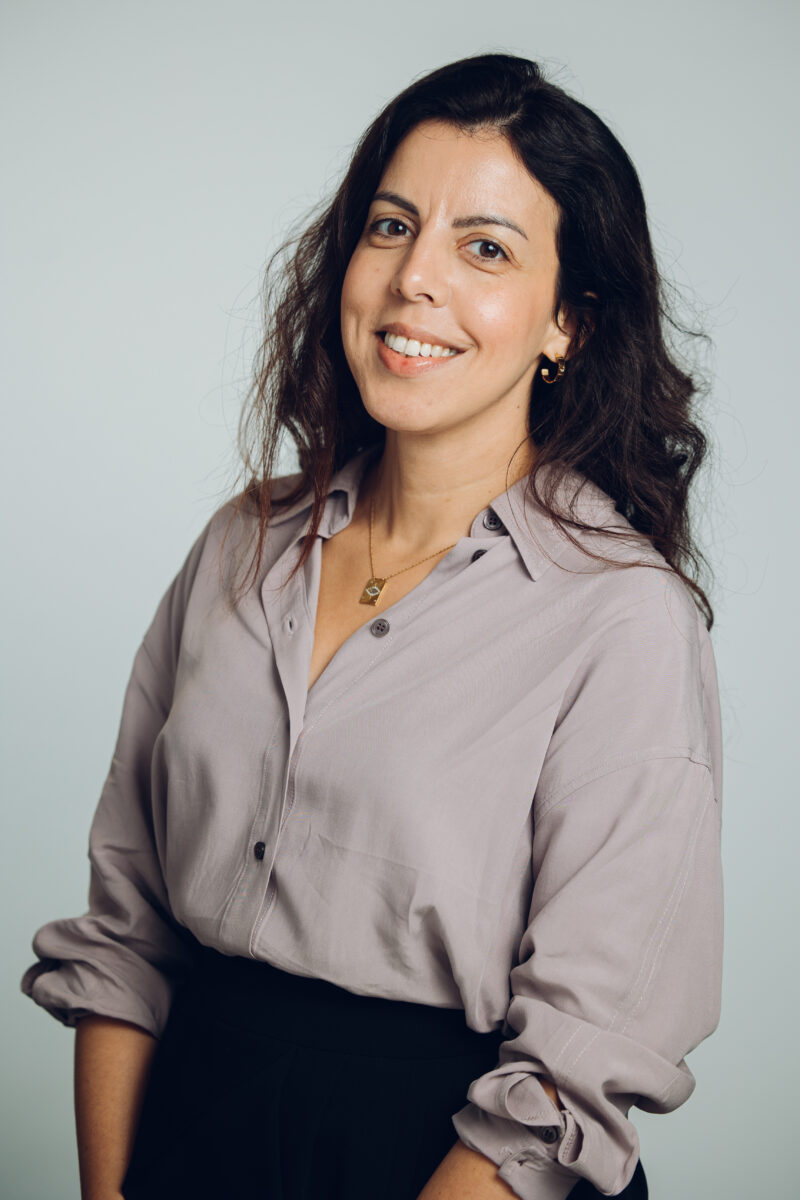
Farah is our Country Lead in Morocco and an experienced Project Manager with a demonstrated history of working in the non-profit sector in Morocco since 2008 within the British Council, the UK’s international organisation for cultural relations and educational opportunities. Between 2019 and 2020, she managed as a consultant the design and delivery of a large-scale EU funded programme “Strengthening Resilience II”. Following Covid-19 crisis, she launched an Arts sector cross-country development fund in Morocco and the UK in support to artists and organisations affected by the pandemic. Skilled in International and Socio-cultural Project Management, Nonprofit Organizations, Cultural Relations and Event Management, Farah has worked on a range of projects and initiatives in different areas including education, heritage protection, cultural development and youth employability. Farah is a graduate in Media Technology from Kingston University and a holder of the European Diploma in Cultural Project Management.
Fatou Diop
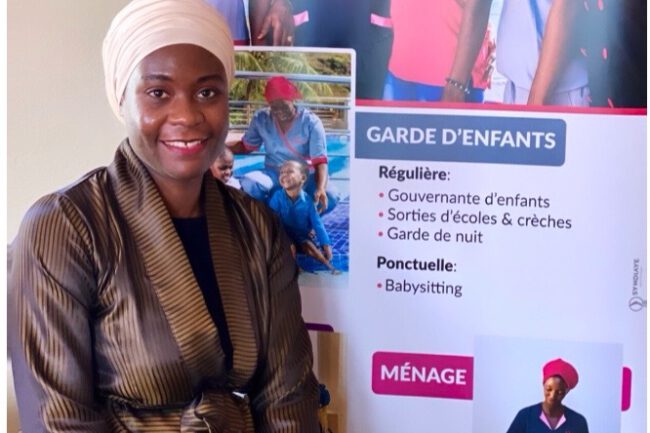
Fatou is the founder of Calinou’nou, a company in the homecare sector that formalises, modernises and valorises jobs in the caretaking industry in Senegal. Fatou’s ambition is to revolutionise the sector with the objectives of, not only offering high quality services, but also providing her employees with a formal working status, a stable income and improving their job stability.
Episode 11
The Power of Social Businesses
“If social enterprises mainly focus on creating job opportunities for the emerging young generation, they’re also indirectly alleviating the social problem that exists in the community.” Abdissa Tegene
In a profit-driven world, social businesses stand out as enterprises committed to addressing social and environmental challenges while maintaining financial sustainability. Emphasizing social impact over profit maximization, these businesses aim to catalyse positive change in communities. This unique approach has significant implications for youth employment, creating employment opportunities that align with the values and aspirations of young people, fostering sustainable economic development, and empowering the next generation with meaningful and purposeful work.
In this episode, our guest speakers Abdissa Tegene, CFYE Country Lead for Ethiopia, Irene Sleven, co-director of VSO Netherlands, and Feven Tsehaye, founder and CEO of Ethiopian business Tchakka Origins, unpack the nuances of business with a robust social focus, the motivations behind these ventures, and how these commitments translate into business success and increased employment opportunities.
Tackling the challenges of social impact, devising approaches specifically for youth and female empowerment, and navigating the intersection of social impact with business portfolios are just a glimpse of the captivating discussions that took place. Listen or watch the full episode for more!
The speakers
Abdissa Tegene
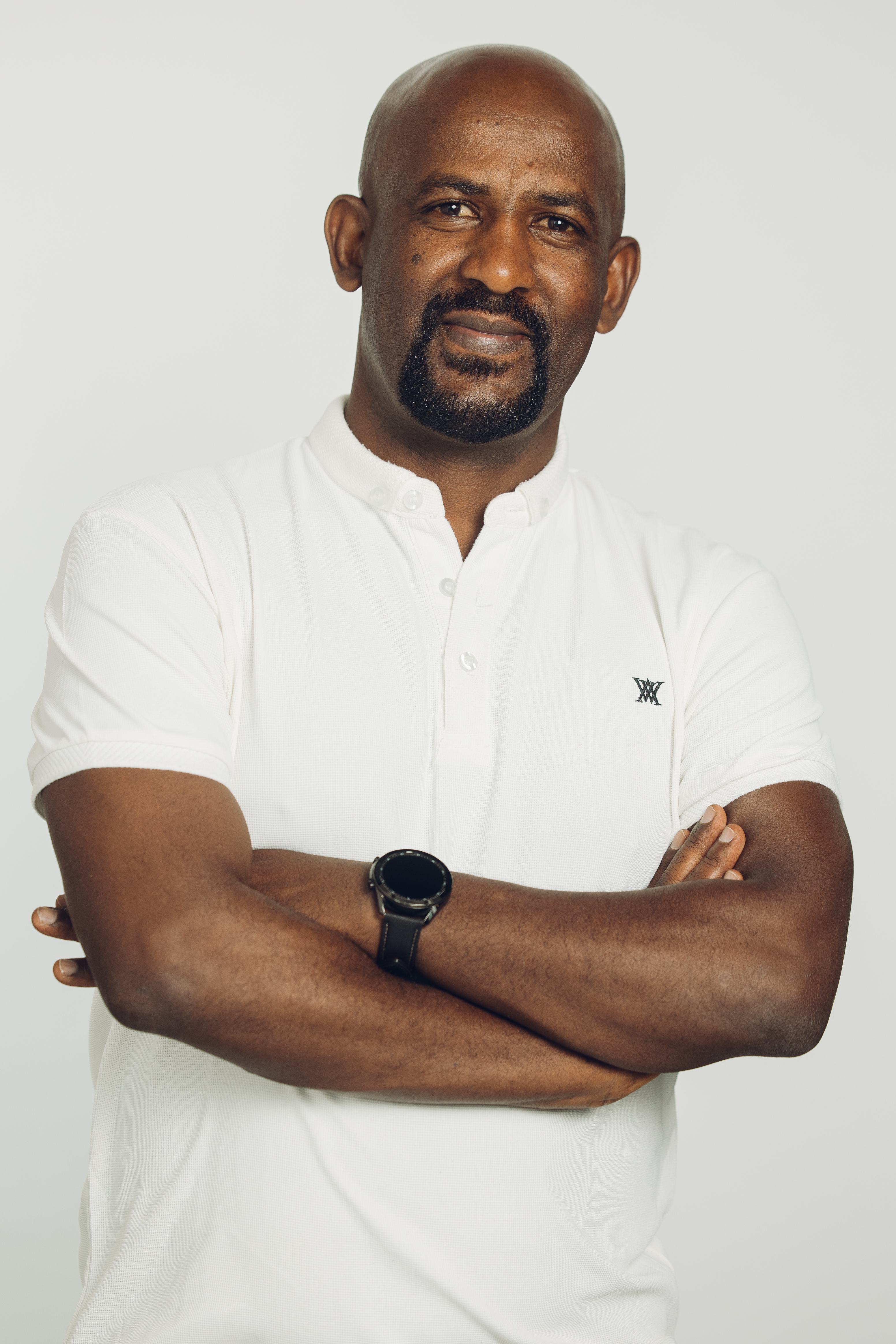
Abdissa is CFYE Country Lead for Ethiopia. He is result oriented, analytical and passionate in development interventions. His educational background MA in Development studies with specialization of Development Management, has given him the right skill set and knowledge to craft sustainable development. Having BA in Business Administration and numerous short-term training in various themes have given him good perspective and understanding of, particularly, rural contexts and livelihoods. He is an experienced leader, manager and expert in rural development of Ethiopia with a demonstrated history of working with INGOs, private sectors, and communities. He has hands on experience in the consultancy sector and provided consultancy service for various organizations in Ethiopia, such as CORDAID, HEKS/EPER, Oxfam GB, SOS Shale, ICCO Cooperation, GIZ, CARE Ethiopia, Reach For Change, CST, APCfC and others.
Feven Tsehaye
Feven is the Founder and CEO of Chakka Origins, Ethiopia’s first supplier of biodiverse specialty natural products, building sustainable supply chains with a conservation-based approach, leveraging agroforestry production systems in natural forest areas. Feven has extensive experience working on social impact investments in agriculture and healthcare across Africa. Prior to starting Chakka Origins, she spent five years at the Bill & Melinda Gates Foundation’s China then Ethiopia office, focusing on engagement models and mechanisms to increase private sectors engagement with particular focus on Ethiopia, Nigeria and Tanzania. Her responsibilities included strategy development, investment planning, business development, deal sourcing, grant management, and managing relationships with key stakeholders across Africa. Feven spent much of her time in field travels, conducting extensive market research and data collection in 2019 to understand the lack of access to natural products, and what can be done to solve this. Through deep rooted understanding of biodiverse ecosystems and meaningful partnerships in each sourcing site, Chakka Origins was formed, leveraging its namesake of forest-based supply of endemic plant products from the land of origins, Ethiopia
Irene Sleven
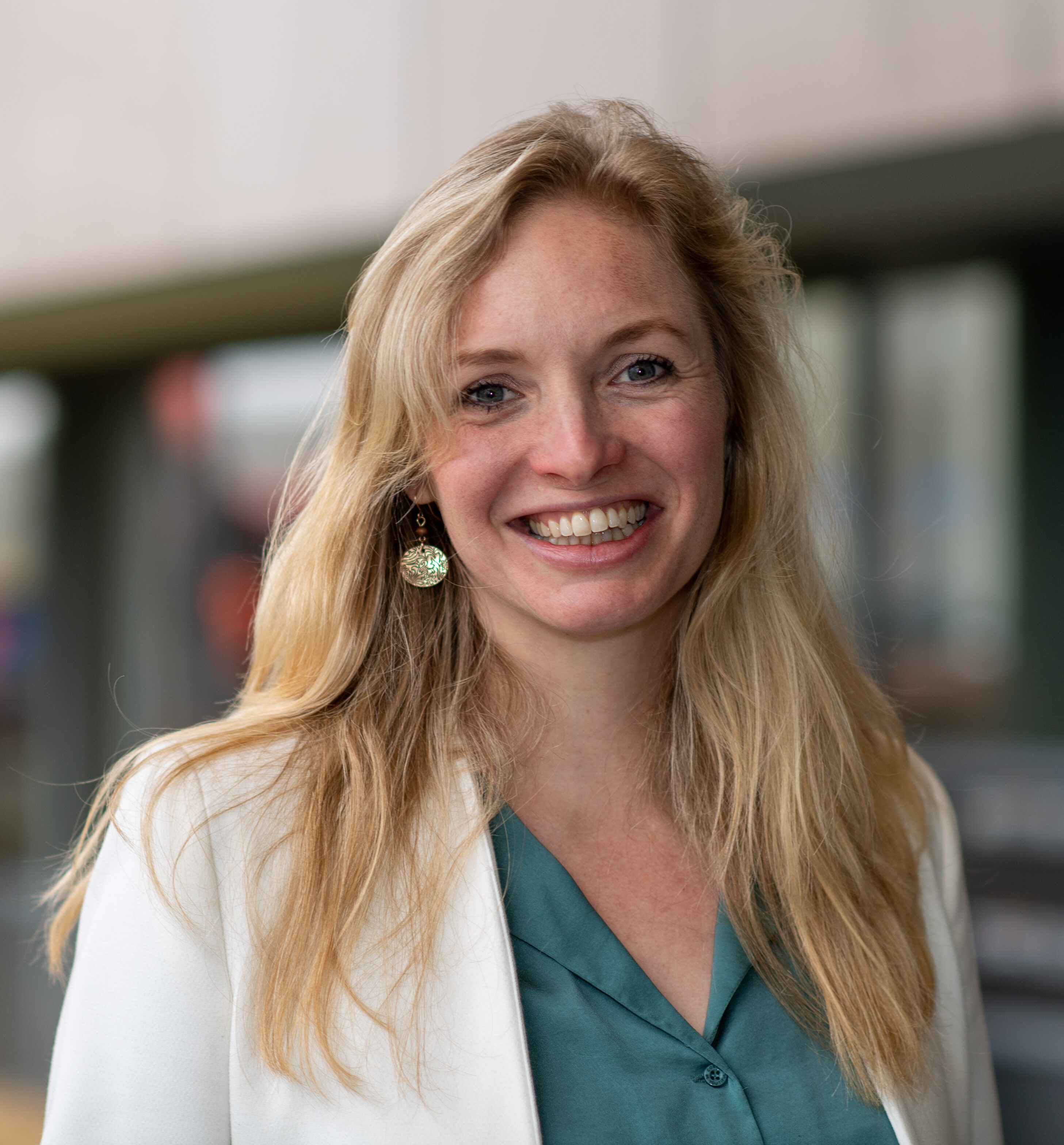
Irene, currently serving as Co-Director at VSO Netherlands, is a seasoned professional with over 15 years of international development expertise. Previously, as Head of Programmes and Partnerships at VSO Netherlands, she played a pivotal role in innovative development cooperation. Irene’s impactful contributions include leading large-scale emergency and recovery programs in Liberia and Iraq during the Ebola and ISIS crises, respectively. Her dedication to gender empowerment, inclusion, and equal opportunities, particularly for youth and women, is evident in her leadership style. Passionate about fostering sustainable, green, and inclusive societies and economies, Irene encourages a knowledge-sharing culture and values creativity and innovation in her work. In her current role, she oversees strategic policy development, effective communication, and internal coordination, managing personnel and ensuring governance reporting. Driven to create positive change, Irene actively connects people and expertise, seeking win-win situations within and outside VSO Netherlands to contribute to a fair and sustainable world.
Episode 10
Economic Resilience in the Face of Political Uncertainty
“Sudan’s population is almost 80% youth, so you can imagine the impact of the war on youth in terms of employment. Initiatives are needed to ensure young people find the right jobs to generate these much needed revenue streams to be able to sustain a decent living.”
Ahmed Darwish, CFYE Country Lead – Sudan
Political and economic uncertainty, conflict and insecurity have negative impacts on entire populations. However, these affect vulnerable groups – such as youth and women – in a disproportionate manner. In fragile contexts, their already precarious social and economic situation gets exacerbated by sudden shocks in the labour market, leaving them with fewer and poorer job opportunities.
In this episode, our guest speakers Ahmed Darwish, CFYE Country Lead for Sudan, Safiya Elfadni from Alsalam Factory and Jonathan Moss, Palladium expert on conflict and stabilisation, discussed the significance of development programs in fragile contexts and how they can be designed to be sustainable also in the long term.
Local ownership, focus on vulnerable groups like youth and women, and going beyond financial support were just some of the examples of good practices that our speakers brought up. Listen or watch the full episode to know more!
The speakers
Ahmed Darwish

Ahmed is a Marketing and Innovation Management professional with vast entrepreneurial expertise and more than 14 years’ experience working with local and international entities in multiple sectors and countries. He enjoys sharing his experience through engaging with various actors in the private sector, with a particular focus on supporting the start-up entrepreneurship ecosystem. Now responsible for supporting CFYE’s Implementing Partners from Sudan as well as the Scale Employment Model (SEM) Challenge Call, and closely collaborating with Technical Assistance, Strategy & Impact, and Learning & Innovation teams to support cross-cutting learning initiatives, his aim is to capitalize on the diversified knowledge and skills gained to build upon and extend those experiences to continue learning and sharing his knowledge and expertise, to ultimately support, catalyse, and scale up responsible and sustainable innovations towards social impact.
Safiya Elfadni
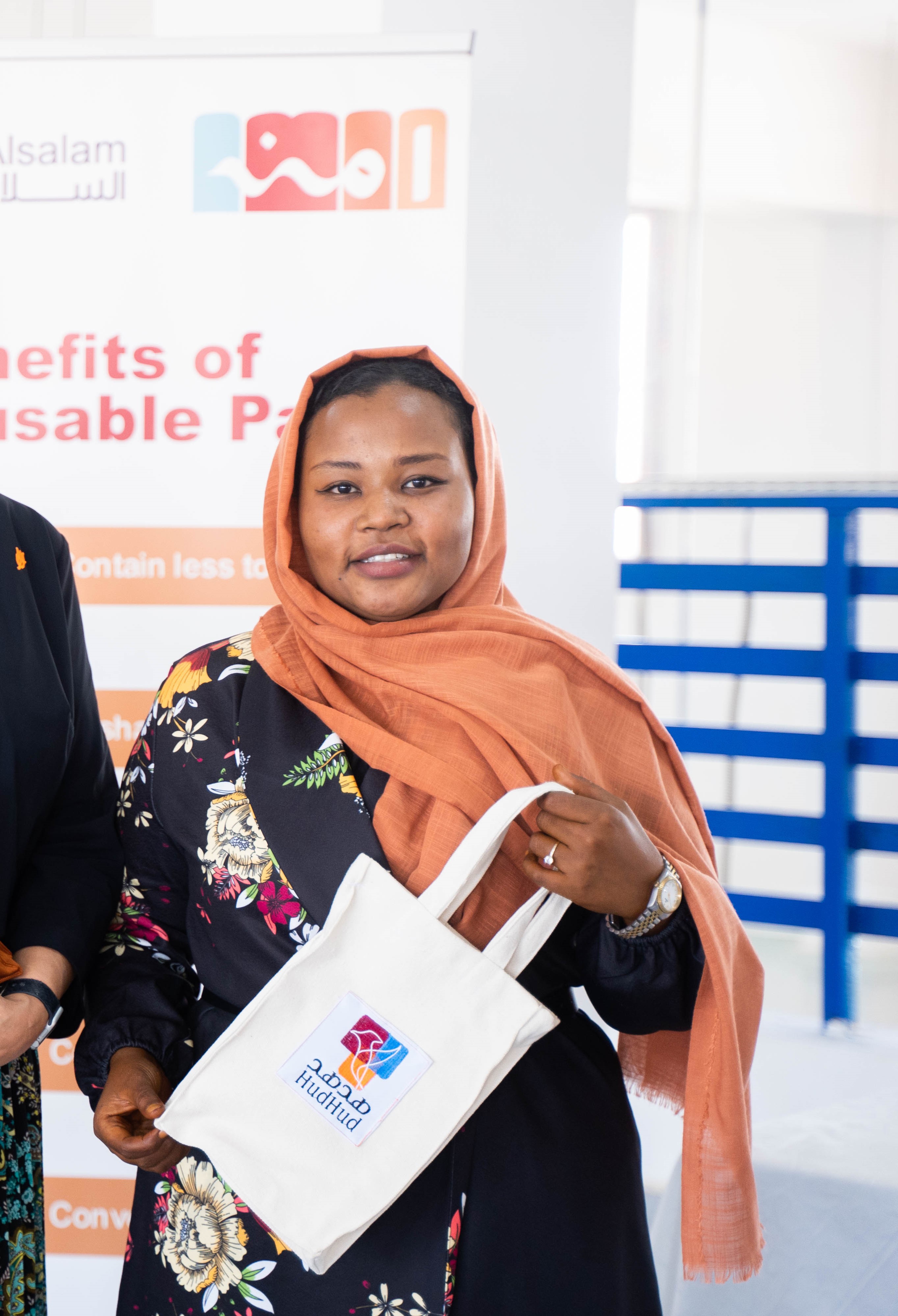
Safiya Elfadni, is the Managing Director of Alsalam Factory, a Sudanese factory which produces and sells innovative products like cotton bags, linen bags, and reusable face masks to meet the increasing demand for sustainable alternatives. This initiative reflects her commitment to women’s health and environmental responsibility, marking a significant stride toward providing sustainable menstrual hygiene solutions in Sudan.
Jonathan Moss
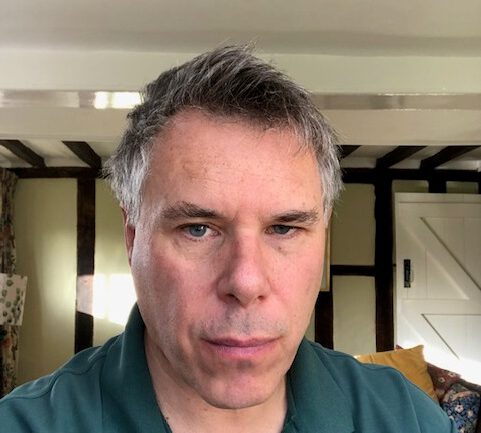
Jonathan Moss, Director of Conflict and Stabilisation at The Palladium Group, has experience in high-value, complex programs in the local governance, security, and justice sectors, particularly in fragile states like Afghanistan and Pakistan. Drawing on extensive expertise, Jonathan highlights the impact that development initiatives can have on communities living in high political instability.
Episode 9
Integrating Green Policies into the Business Domain
“There is a gap in the language we use at conferences and international organisations, and the terminology we use every day. Many words do not exist in our local dialect. If you ask what I would call ‘Green Policy’ in my local language in Uganda, I will have to use more than ten sentences to explain its meaning. The world is changing, and we must change together as a global village.“
Daniel Kayemba, Recycling Operations Specialist
We know that business support is essential to achieving a Net Zero future, but how can we effectively translate environmental policies into our business settings? In this episode, we will explore the opportunities and limitations of green policies in the business sphere.
We hosted three experts who offer key insights into the theory and practicality of green policy implementation from an international business perspective– Rhys Morris, Sarah Oey, and Daniel Kayemba. They offer significant contributions from their relevant backgrounds in a larger corporate entity, intergovernmental delegation, and local small and medium enterprises (SME). Together, they offer a blueprint for navigating green transitions from a policy and business perspective.
The speakers
Rhys Morris
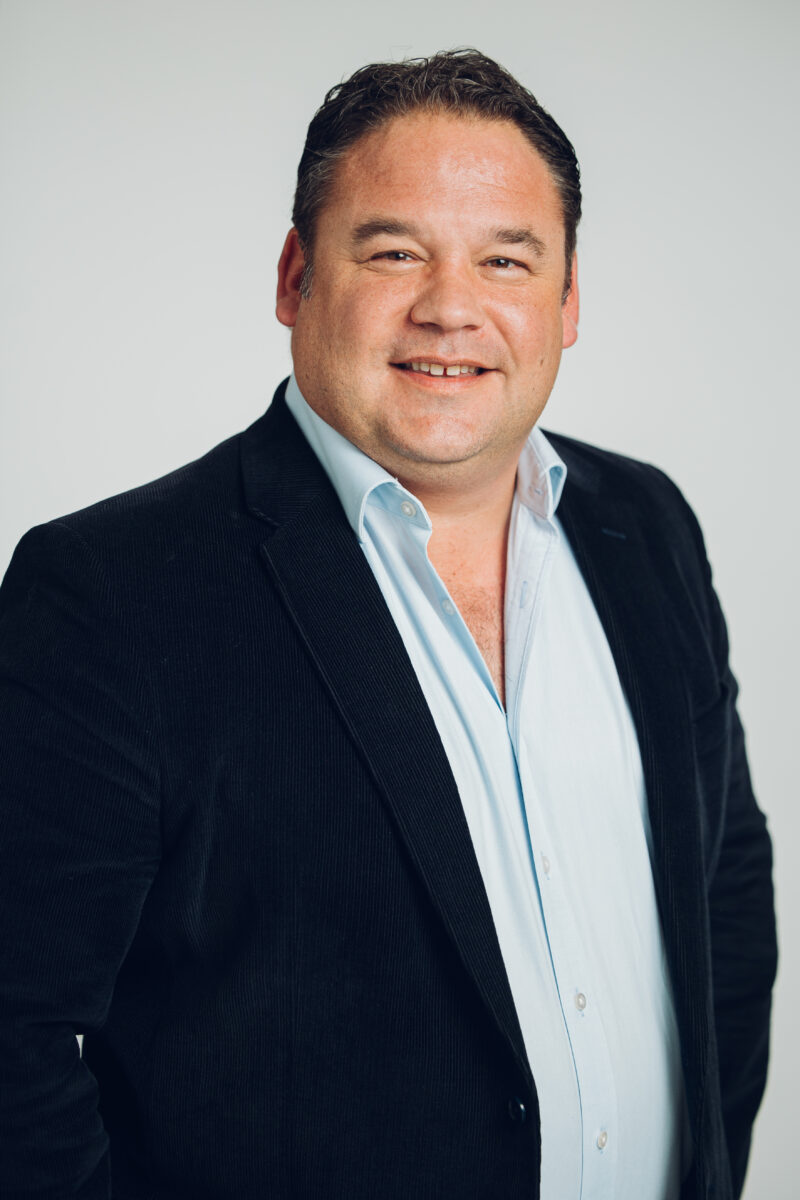 Rhys’ commitment to driving change is channelled through his passion for leading large teams of professionals, he brings his operations expertise and collaborative approach to the management of the EMEA business. As Palladium’s Regional Business Partner in EMEA and as Project Director of the CFYE, Rhys draws on his wealth of experience to deliver the best possible standards in operating procedures, striving to ensure an equitable future for all.
Rhys’ commitment to driving change is channelled through his passion for leading large teams of professionals, he brings his operations expertise and collaborative approach to the management of the EMEA business. As Palladium’s Regional Business Partner in EMEA and as Project Director of the CFYE, Rhys draws on his wealth of experience to deliver the best possible standards in operating procedures, striving to ensure an equitable future for all.
Daniel Kayemba
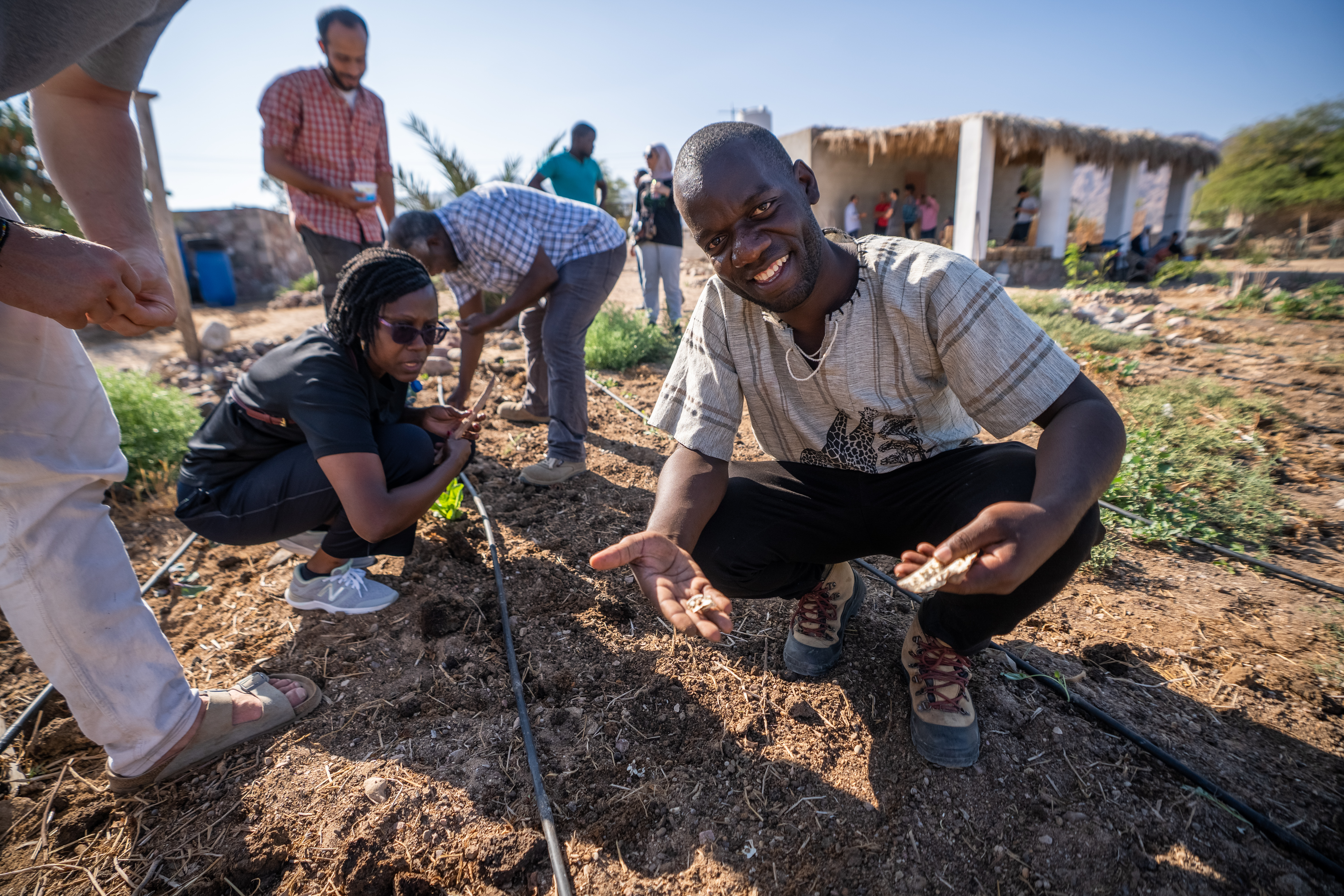 Daniel channels his passion and dedication for waste management as an operations specialist at Eco Brixs. His desire to enact change is matched by his uncanny ability to share his expertise with his local community by providing hands-on experience to empower young people to become champions of change in their communities. By promoting a circular economy mindset, Daniel strives to create a more sustainable future.
Daniel channels his passion and dedication for waste management as an operations specialist at Eco Brixs. His desire to enact change is matched by his uncanny ability to share his expertise with his local community by providing hands-on experience to empower young people to become champions of change in their communities. By promoting a circular economy mindset, Daniel strives to create a more sustainable future.
Sarah Oey
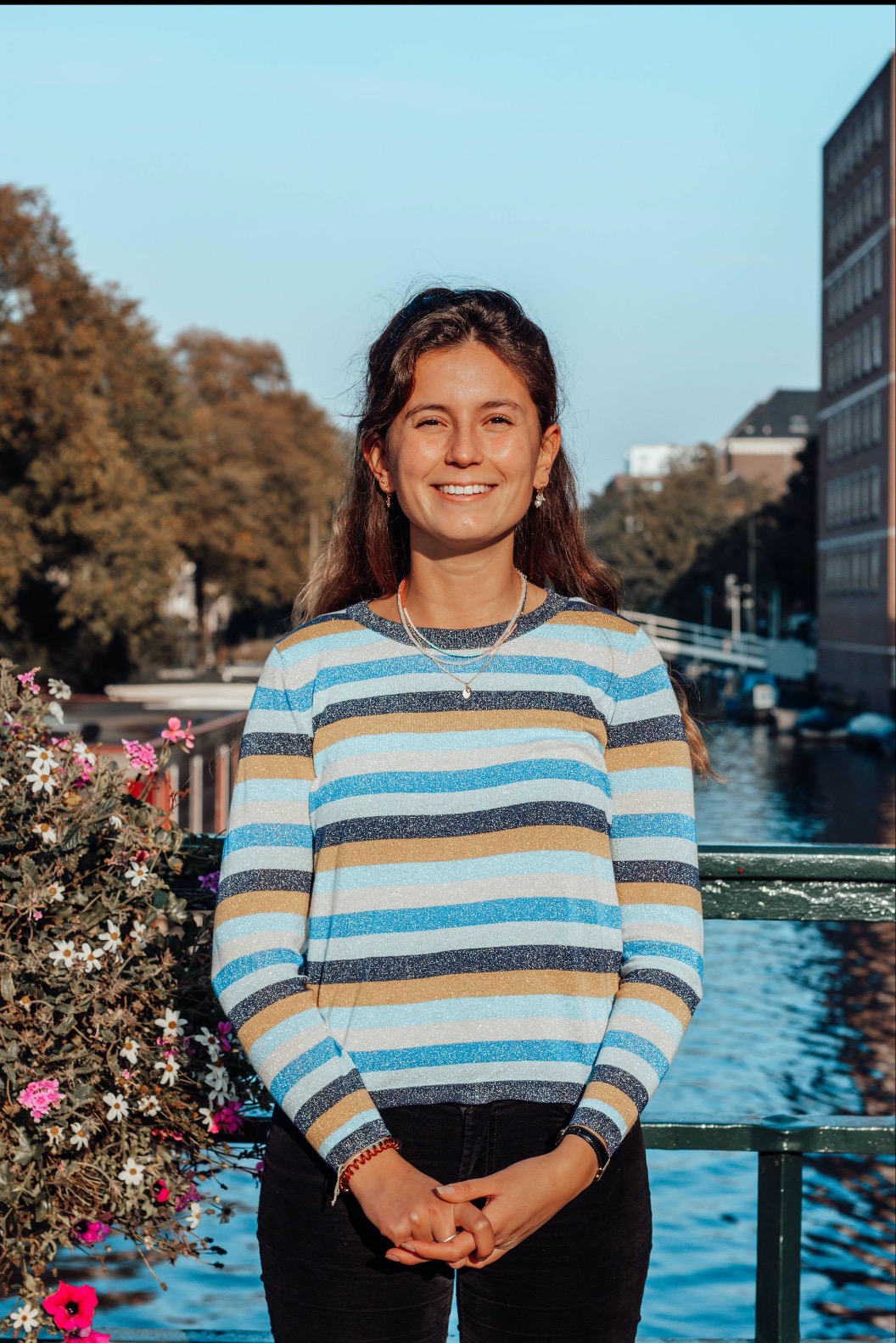 Sarah Oey is the UN Youth Representative on Sustainable Development from The Netherlands. Amongst others, Sarah is representing Dutch youth towards the United Nations Framework Convention on Climate Change (UNFCCC) and is attending COP28 later this year. Next to her work, she is also a MA student in International Relations at the University of Groningen.
Sarah Oey is the UN Youth Representative on Sustainable Development from The Netherlands. Amongst others, Sarah is representing Dutch youth towards the United Nations Framework Convention on Climate Change (UNFCCC) and is attending COP28 later this year. Next to her work, she is also a MA student in International Relations at the University of Groningen.
Episode 8
Strengthening Connections through Youth Networks
“In order to retain youth, you should not only focus on salaries. There needs to be a feeling of belonging, the feeling of being appreciated. That’s not only reflected in the salary. We saw a much lower youth turnover rate in the company when we started building this network.”
Natalie Ayoub, Youth Network Leader
As organisations aim to establish a youth-friendly workplace, they might overlook a powerful tool that can significantly enhance youth engagement: Young Employee Networks (YENs). YENs provide a supportive environment where young employees can openly share their concerns and build a community based on common experiences and interests. In this episode, we explore the immense power of YEN in retaining youth and its potential to foster an inclusive and supportive workplace for young employees.
The speakers
Natalie Ayoub
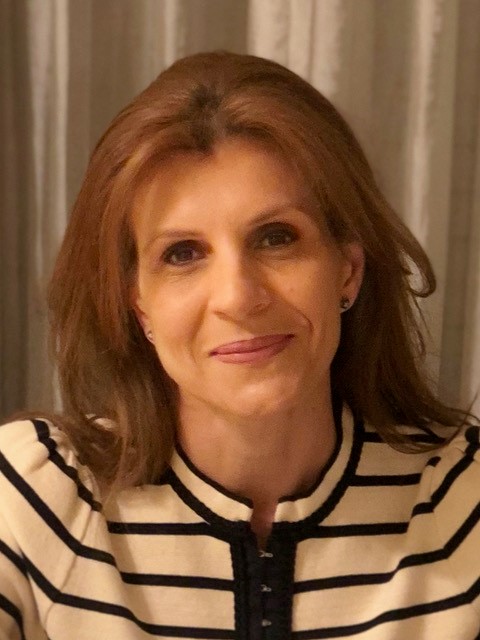
Natalie believes that empowering youth is the way forward! Most of her work evolves around youth. Her most recent ‘adventure’ was running a project that supports youth through career guidance, capacity building, and job-matching. As an economic consultant, Natalie also worked on projects that gear towards youth employment, such as preparing a database for all Jordanian TVET institutions, with their vocational training programs, identifying the skills mismatch in the manufacturing sector, and highlighting the inequalities within the labor market, in terms of gender, education, and occupation.
Goodness Oluchi Obijuru
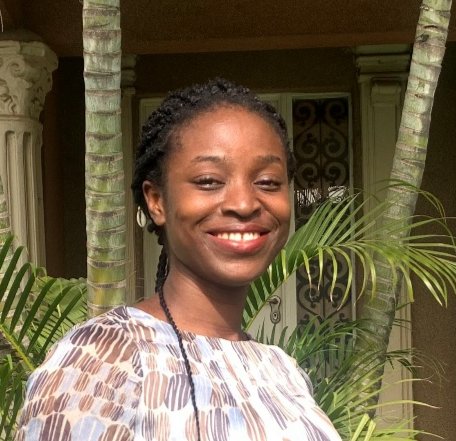
Goodness is a CFYE Youth Champion currently working to amplify the voices of young people, she is a member of the National Youth Engagement Network. She is a youth advocate and M&E enthusiast and a serial volunteer. She is also a National volunteer with Voluntary Services Overseas (VSO) and a social media Influencer with the National Youth Engagement Network (NYEN). Her commitment and dedication earned her a Certificate Of Recognition in the International Volunteers Day (IVD) 2019.
Emilie de Haes
Emilie is an active member of YOUNG Randstad.
Episode 7
Young women to the front
“Organisations cannot treat equity, diversity, and inclusion (EDI) as a mere HR function. EDI permeates to everything an organisation does, including building solid relationships with customers and the supply chain. Therefore, more inclusive and eqitable organisations benefit not only women, but the company as a whole.”
Rosanna Duncan, Diversity and Inclusion Specialist
Despite progress made in recent years, gender barriers still hinder young women from fully engaging in the workforce. Addressing these barriers is crucial to achieving gender equality, but true equality extends beyond simply creating job opportunities for women. We must also cultivate gender-inclusive conditions that empower women to pursue their aspirations and advance into leadership roles.
In this podcast episode, we had the honour of hosting four outstanding guests – Rosanna Duncan, Felicity Sibindi, Jennifer Ndegwa, and Nabihah Rishad. They delve deep into the structural barriers that young women face and share their valuable insights on establishing inclusive conditions for women in the workforce.
In this episode, we delved into the definition of green jobs across various sectors and countries and examined the necessary skill sets to ensure retention and meaningful engagement in such jobs.
The speakers
Felicity Sibindi
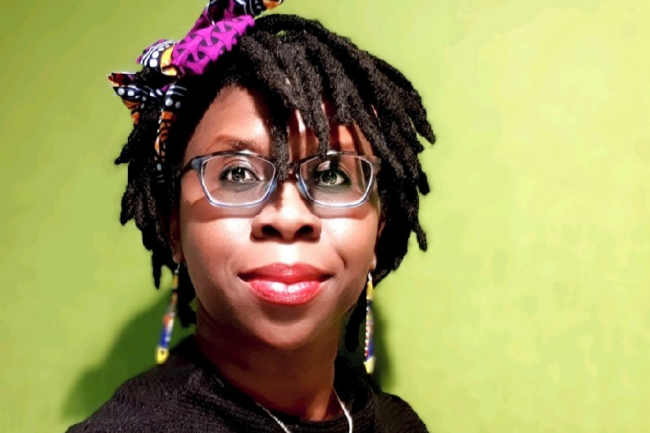 Felicity Sibindi is a public health practitioner, African feminist and women’s and climate rights activist who has worked across Africa in primary health care service provision and feminist advocacy to amplify the voices of women and vulnerable groups and communities from sex workers in South Africa, Malawi and Zimbabwe, to LGBTQ+ communities in Nigeria, and women’s rights groups in Ethiopia, Kenya, Uganda and Rwanda. Her work focuses on the intersection of issues affecting women and vulnerable communities, from economic resilience and fighting exploitative and extractive industries to health care, sexual and reproductive health and rights, and challenging systems of power which put women’s lives at risk. Felicity leverages on newly accessible models of media and digital technology to bring innovation to more traditional forms of grassroots advocacy. She believes in the power of authentic African voices to raise awareness around sexual and reproductive health and rights issues locally, regionally and at the international policy level. She seeks future-facing, practical and sustainable solutions for building strong, resilient communities. Felicity has confidence that girls are the future and that they will determine for themselves the direction that the world will move beyond this current global crisis.
Felicity Sibindi is a public health practitioner, African feminist and women’s and climate rights activist who has worked across Africa in primary health care service provision and feminist advocacy to amplify the voices of women and vulnerable groups and communities from sex workers in South Africa, Malawi and Zimbabwe, to LGBTQ+ communities in Nigeria, and women’s rights groups in Ethiopia, Kenya, Uganda and Rwanda. Her work focuses on the intersection of issues affecting women and vulnerable communities, from economic resilience and fighting exploitative and extractive industries to health care, sexual and reproductive health and rights, and challenging systems of power which put women’s lives at risk. Felicity leverages on newly accessible models of media and digital technology to bring innovation to more traditional forms of grassroots advocacy. She believes in the power of authentic African voices to raise awareness around sexual and reproductive health and rights issues locally, regionally and at the international policy level. She seeks future-facing, practical and sustainable solutions for building strong, resilient communities. Felicity has confidence that girls are the future and that they will determine for themselves the direction that the world will move beyond this current global crisis.
Nabihah Rishad
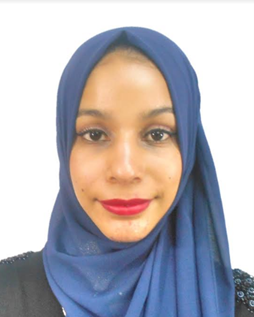 Nabihah is the principal risk consultant at Serianu Ltd. She has over 7 years’ experience in assessing companies in Banking, Insurance, Healthcare, Legal and Manufacturing sector. She holds a Master of Science Degree in Information Technology Management from the University of Nairobi. In addition, she is NSE 1,2,3 certified. She helps organisations identify, quantify and monitor risks (Cyber, operational, financial, regulatory) impacting their operations. She has worked on a number of research articles and reports including the Africa Cybersecurity report that spans over 10 African countries and collaborated with various industry professionals within the Institute of Risk Management (IRM) to design the Cyber Visibility and Exposure Quantification (CVEQTM) Framework. In addition, she leads the Serianu Cyber Immersion Program which is an outreach cybersecurity training program targeting university students.
Nabihah is the principal risk consultant at Serianu Ltd. She has over 7 years’ experience in assessing companies in Banking, Insurance, Healthcare, Legal and Manufacturing sector. She holds a Master of Science Degree in Information Technology Management from the University of Nairobi. In addition, she is NSE 1,2,3 certified. She helps organisations identify, quantify and monitor risks (Cyber, operational, financial, regulatory) impacting their operations. She has worked on a number of research articles and reports including the Africa Cybersecurity report that spans over 10 African countries and collaborated with various industry professionals within the Institute of Risk Management (IRM) to design the Cyber Visibility and Exposure Quantification (CVEQTM) Framework. In addition, she leads the Serianu Cyber Immersion Program which is an outreach cybersecurity training program targeting university students.
Jennifer Ndegwa
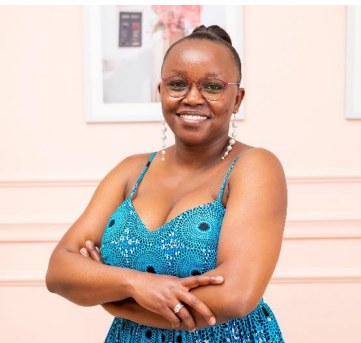
Jennifer Ndegwa is the Project Coordinator of Cyber Shujaa, a Cybersecurity Immersion program for youth in Kenya. She is a recent graduate from the University of Nairobi with a bachelor’s degree in Computer Science and is a trained Software Engineer and Cyber Security Analyst. Jenn is currently finding joy in using her skills and expertise to contribute to the exciting training and mentorship activities of Cyber Shujaa in Kenyan Cyberspace. She is passionate about ICT and is committed to providing secure access to technologies. As a Cyber Shujaa alumni, Jennifer is thrilled to be part of the team grooming and developing ethical and skilled Cybersecurity professionals for Kenya and, eventually, Africa.
Rosanna Duncan
Episode 7
Young women to the front
“Organisations cannot treat equity, diversity, and inclusion (EDI) as a mere HR function. EDI permeates to everything an organisation does, including building solid relationships with customers and the supply chain. Therefore, more inclusive and eqitable organisations benefit not only women, but the company as a whole.”
Rosanna Duncan, Diversity and Inclusion Specialist
Despite progress made in recent years, gender barriers still hinder young women from fully engaging in the workforce. Addressing these barriers is crucial to achieving gender equality, but true equality extends beyond simply creating job opportunities for women. We must also cultivate gender-inclusive conditions that empower women to pursue their aspirations and advance into leadership roles.
In this podcast episode, we had the honour of hosting four outstanding guests – Rosanna Duncan, Felicity Sibindi, Jennifer Ndegwa, and Nabihah Rishad. They delve deep into the structural barriers that young women face and share their valuable insights on establishing inclusive conditions for women in the workforce.
In this episode, we delved into the definition of green jobs across various sectors and countries and examined the necessary skill sets to ensure retention and meaningful engagement in such jobs.
The speakers
Felicity Sibindi
 Felicity Sibindi is a public health practitioner, African feminist and women’s and climate rights activist who has worked across Africa in primary health care service provision and feminist advocacy to amplify the voices of women and vulnerable groups and communities from sex workers in South Africa, Malawi and Zimbabwe, to LGBTQ+ communities in Nigeria, and women’s rights groups in Ethiopia, Kenya, Uganda and Rwanda. Her work focuses on the intersection of issues affecting women and vulnerable communities, from economic resilience and fighting exploitative and extractive industries to health care, sexual and reproductive health and rights, and challenging systems of power which put women’s lives at risk. Felicity leverages on newly accessible models of media and digital technology to bring innovation to more traditional forms of grassroots advocacy. She believes in the power of authentic African voices to raise awareness around sexual and reproductive health and rights issues locally, regionally and at the international policy level. She seeks future-facing, practical and sustainable solutions for building strong, resilient communities. Felicity has confidence that girls are the future and that they will determine for themselves the direction that the world will move beyond this current global crisis.
Felicity Sibindi is a public health practitioner, African feminist and women’s and climate rights activist who has worked across Africa in primary health care service provision and feminist advocacy to amplify the voices of women and vulnerable groups and communities from sex workers in South Africa, Malawi and Zimbabwe, to LGBTQ+ communities in Nigeria, and women’s rights groups in Ethiopia, Kenya, Uganda and Rwanda. Her work focuses on the intersection of issues affecting women and vulnerable communities, from economic resilience and fighting exploitative and extractive industries to health care, sexual and reproductive health and rights, and challenging systems of power which put women’s lives at risk. Felicity leverages on newly accessible models of media and digital technology to bring innovation to more traditional forms of grassroots advocacy. She believes in the power of authentic African voices to raise awareness around sexual and reproductive health and rights issues locally, regionally and at the international policy level. She seeks future-facing, practical and sustainable solutions for building strong, resilient communities. Felicity has confidence that girls are the future and that they will determine for themselves the direction that the world will move beyond this current global crisis.
Nabihah Rishad
 Nabihah is the principal risk consultant at Serianu Ltd. She has over 7 years’ experience in assessing companies in Banking, Insurance, Healthcare, Legal and Manufacturing sector. She holds a Master of Science Degree in Information Technology Management from the University of Nairobi. In addition, she is NSE 1,2,3 certified. She helps organisations identify, quantify and monitor risks (Cyber, operational, financial, regulatory) impacting their operations. She has worked on a number of research articles and reports including the Africa Cybersecurity report that spans over 10 African countries and collaborated with various industry professionals within the Institute of Risk Management (IRM) to design the Cyber Visibility and Exposure Quantification (CVEQTM) Framework. In addition, she leads the Serianu Cyber Immersion Program which is an outreach cybersecurity training program targeting university students.
Nabihah is the principal risk consultant at Serianu Ltd. She has over 7 years’ experience in assessing companies in Banking, Insurance, Healthcare, Legal and Manufacturing sector. She holds a Master of Science Degree in Information Technology Management from the University of Nairobi. In addition, she is NSE 1,2,3 certified. She helps organisations identify, quantify and monitor risks (Cyber, operational, financial, regulatory) impacting their operations. She has worked on a number of research articles and reports including the Africa Cybersecurity report that spans over 10 African countries and collaborated with various industry professionals within the Institute of Risk Management (IRM) to design the Cyber Visibility and Exposure Quantification (CVEQTM) Framework. In addition, she leads the Serianu Cyber Immersion Program which is an outreach cybersecurity training program targeting university students.
Jennifer Ndegwa

Jennifer Ndegwa is the Project Coordinator of Cyber Shujaa, a Cybersecurity Immersion program for youth in Kenya. She is a recent graduate from the University of Nairobi with a bachelor’s degree in Computer Science and is a trained Software Engineer and Cyber Security Analyst. Jenn is currently finding joy in using her skills and expertise to contribute to the exciting training and mentorship activities of Cyber Shujaa in Kenyan Cyberspace. She is passionate about ICT and is committed to providing secure access to technologies. As a Cyber Shujaa alumni, Jennifer is thrilled to be part of the team grooming and developing ethical and skilled Cybersecurity professionals for Kenya and, eventually, Africa.
Rosanna Duncan
Episode 6
The future of work is green
“Green jobs are the future of work. But some high potential green jobs sectors, such as agriculture or waste management, may be perceived as unattractive by youth. Fostering shared knowledge for business owners and employees can help change this perspective.”
Ninja Lacey, Knowledge Management Expert
Climate change and urbanization will offer young people both opportunities and potential obstacles as they navigate the future. As a potential solution to the rising challenges of climate change, poverty alleviation, and inequality reduction, the concept of a ‘Green Economy’ is emerging.
In this episode, we delved into the definition of green jobs across various sectors and countries and examined the necessary skill sets to ensure retention and meaningful engagement in such jobs.
The speakers
Ninja Lacey
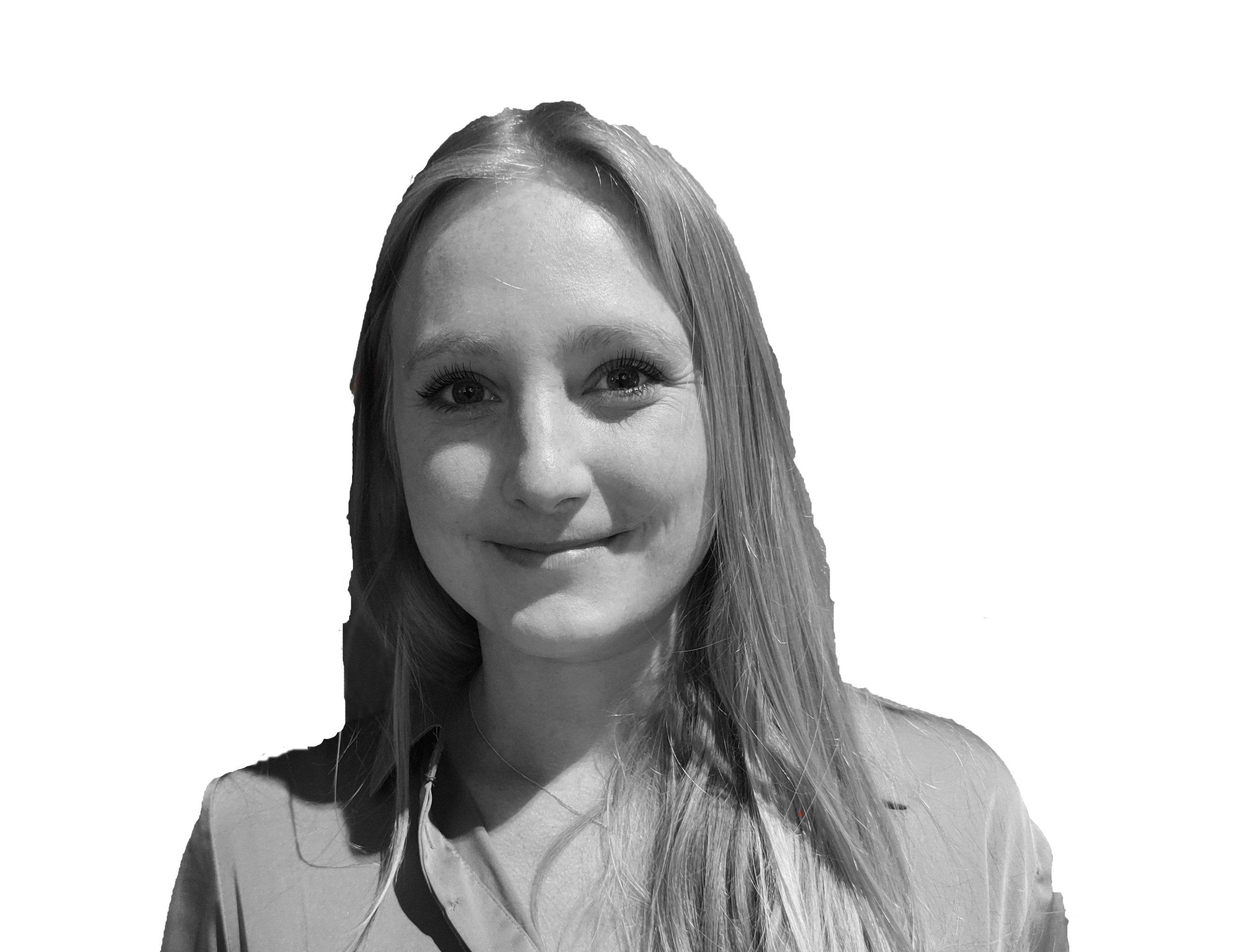 Ninja Lacey is a knowledge broker at The Broker and the INCLUDE Knowledge Platform, a Dutch-African platform that promotes evidence-based policymaking on inclusive development in Africa through research, knowledge sharing and policy dialogue. Ninja’s main interests relate to food security, inclusive development and youth employment – with a specific focus on green job creation. As a knowledge broker, Ninja is passionate about building partnerships and translating knowledge into impact.
Ninja Lacey is a knowledge broker at The Broker and the INCLUDE Knowledge Platform, a Dutch-African platform that promotes evidence-based policymaking on inclusive development in Africa through research, knowledge sharing and policy dialogue. Ninja’s main interests relate to food security, inclusive development and youth employment – with a specific focus on green job creation. As a knowledge broker, Ninja is passionate about building partnerships and translating knowledge into impact.
Camee van Knippenberg
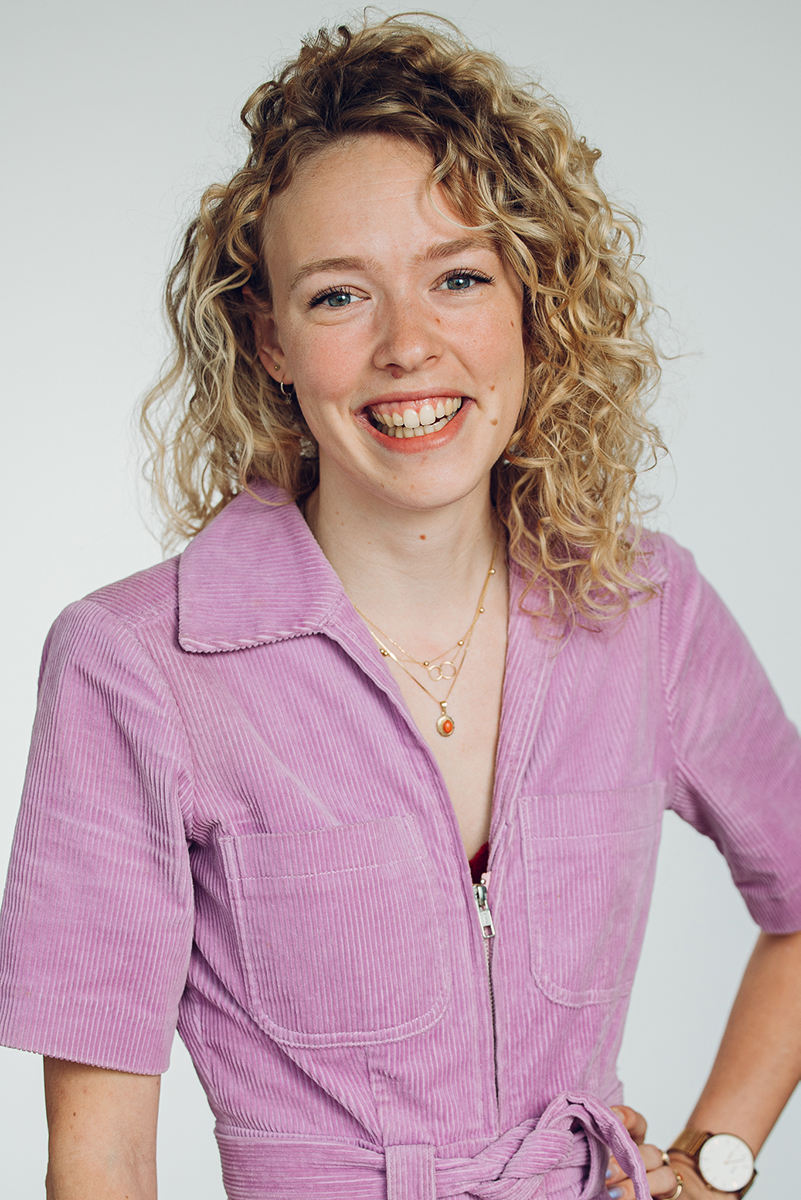 Camee works in the Results, Data and Impact Team of the Challenge Fund for Youth Employment. She enjoys using data to gather insights and sharing the understanding collected to continuously improve performance. Camee is passionate about sustainability and is convinced that green jobs are the future. Camee leads the Challenge Fund for Youth Employment’s learning agenda on ‘The Future of Work’ is green.
Camee works in the Results, Data and Impact Team of the Challenge Fund for Youth Employment. She enjoys using data to gather insights and sharing the understanding collected to continuously improve performance. Camee is passionate about sustainability and is convinced that green jobs are the future. Camee leads the Challenge Fund for Youth Employment’s learning agenda on ‘The Future of Work’ is green.
Majina Mwasezi
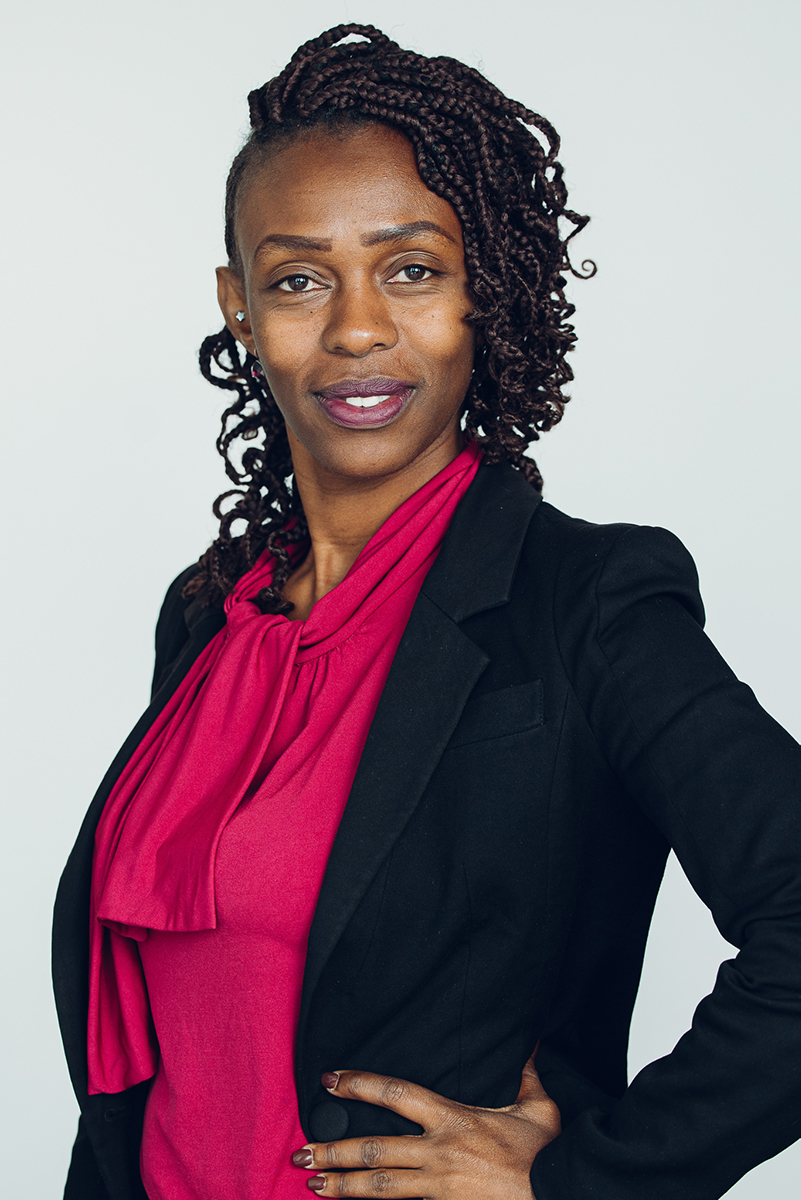 Majina is a Youth engagement practitioner, working to promote inclusive and responsive programming. She currently works as a Youth and Gender champions advisor, coordinating the work of youth champions, whose role is to amplify youth voices and aspirations within the programme, and with external stakeholders on matters relating to the Green Economy and Digitally enabled jobs among other sectors. Majina is an environment enthusiast and believes that everyone has a role to play towards a sustainable future.
Majina is a Youth engagement practitioner, working to promote inclusive and responsive programming. She currently works as a Youth and Gender champions advisor, coordinating the work of youth champions, whose role is to amplify youth voices and aspirations within the programme, and with external stakeholders on matters relating to the Green Economy and Digitally enabled jobs among other sectors. Majina is an environment enthusiast and believes that everyone has a role to play towards a sustainable future.
Episode 5
The future of work is digital
“Digital transition must be inclusive; marginalised groups, such as women, youth and low-income workers, cannot be left behind. So when the private sector is designing solutions, it should adapt its strategies to meet the specific needs of these groups.”
Carolijn Gommans, Business Development Expert
Digital work is rising globally. Technological developments introduce new trends and opportunities in the labour market while making certain jobs obsolete. The shifts technology initiates lay the foundation for a new future of work – a digital future.
In this episode, we dive deep into the concept of digital transition and jobtech and explore its impact on making work accessible and inclusive. The episode also illustrates the tangible positive outcomes some businesses created for African youth through technology.
The speakers
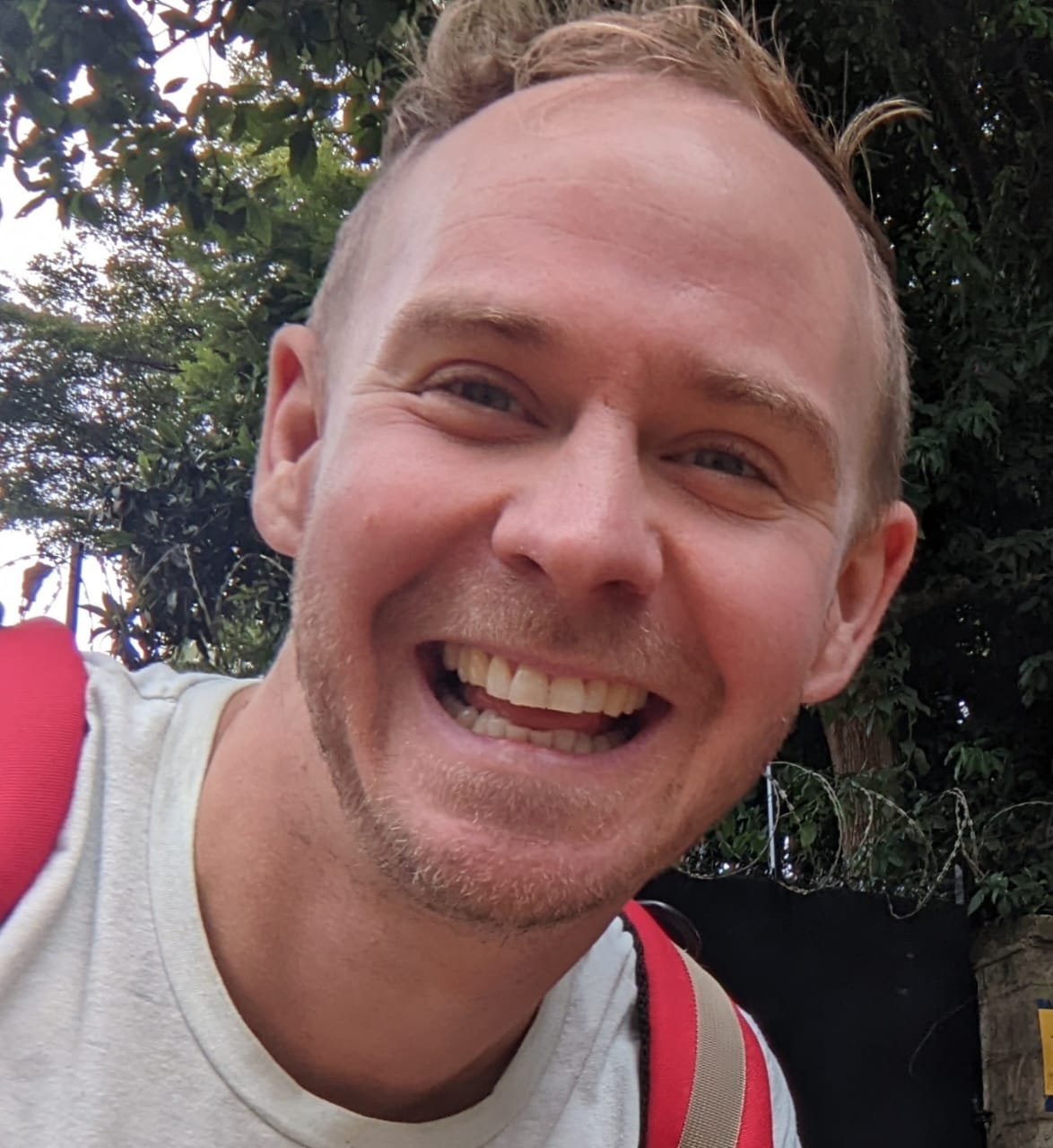 Christopher Maclay
Christopher Maclay
Chris is passionate about employment, technology, and start-ups. He’s currently Mercy Corps’ Program Director at the Jobtech Alliance, an ecosystem-building initiative bringing together start-ups, support organizations, and funders working on the future of work and the platform economy. He has spent over a decade working in the youth employment and economic development space in Africa, Asia, and his native UK, working with NGOs, donors, and the private sector. Most recently, he was Chief Operating Officer at Lynk, the Kenyan gig matching platform for informal workers.
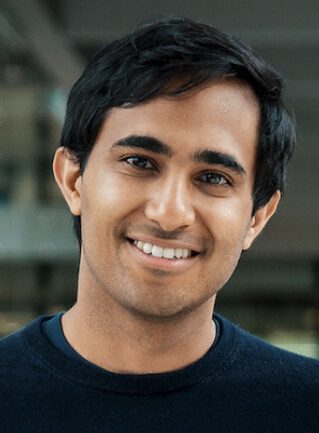 Taha Bawa
Taha Bawa
Taha leads Goodwall, a social enterprise closing the global youth skills gap. Goodwall’s platform supports over 2 million youth in 150+ countries to develop and demonstrate their skills, and connects them to learning and earning opportunities. He is a WEF Global Shaper, Forbes 30under30 and a member of Young Presidents’ Organisation. He participates in Adecco Foundation’s Advisory and Generation Unlimited’s Global Leadership Council. He studied at the Universities of Oxford and Lausanne.
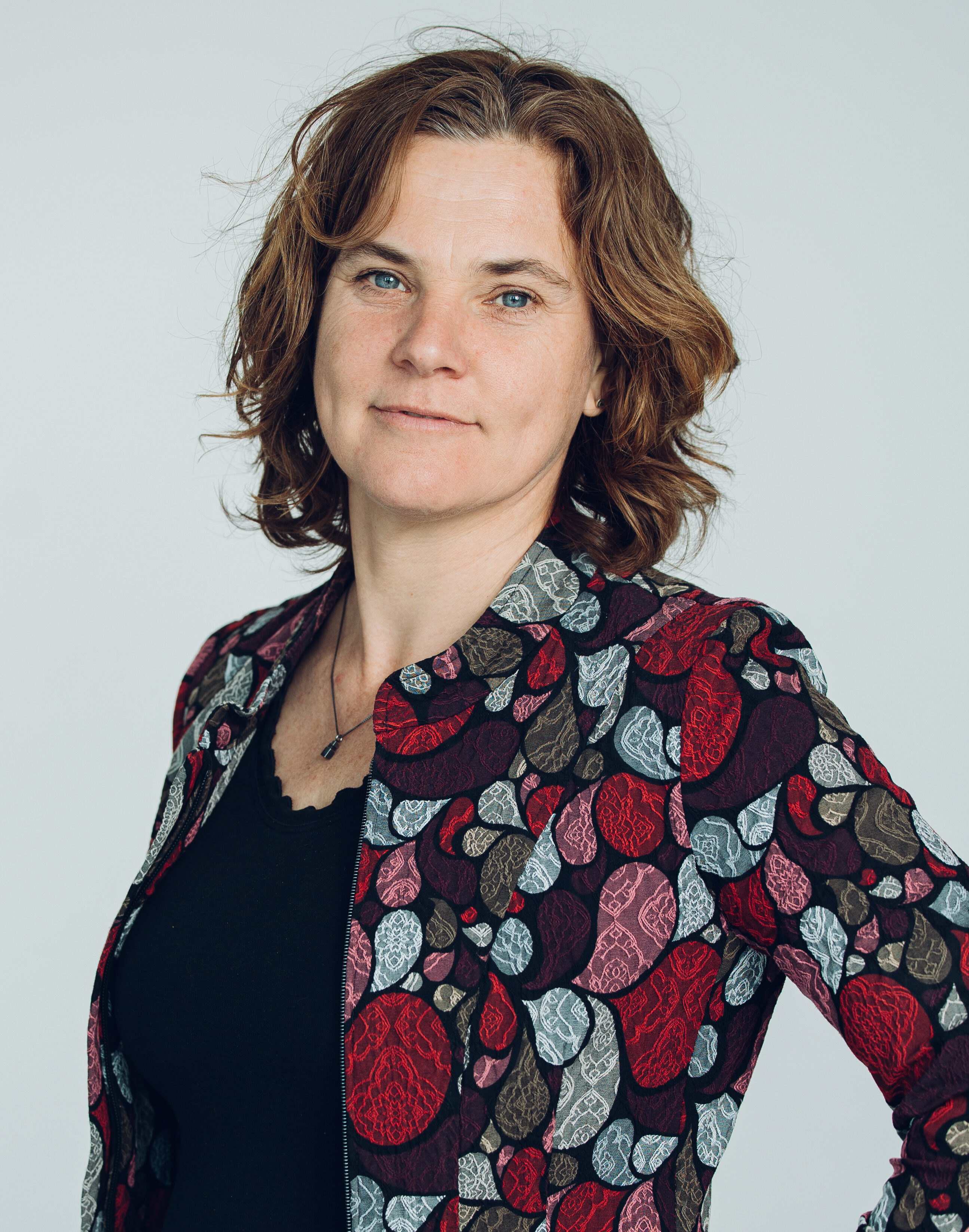
Carolijn Gommans
Carolijn Gommans is a development economist who has lived and worked for over 25 years in East and Southern Africa. She is a connector who loves to find solutions that consider the perspectives of different stakeholders and jointly design practical solutions that are grounded in data. She is excited about the positive impact she has seen digital technologies bring to women and people living in rural communities and the great opportunities it offers to young people. Carolijn leads the Challenge Fund for Youth Employment’s learning agenda on ‘ The Future of Work’ is digital. Previously she advised the largest bank in Zambia, Zanaco, on their digital strategy that enabled the bank to be present in all of Zambia’s districts.
Asante Omeke
Asante Omeke is a 16-year-old Ugandan who is doing her International IB at the United World College Maastricht, Netherlands. She was selected to present her Hope for Uganda at the inaugural ILX forum before an audience of investment bankers and pension fund managers, where she inspired them with her bold yet hopeful aspirations for Ugandan youth.
Episode 4
A blended approach to volunteering
“Having a national volunteer that was able to bring me up to speed with cultural differences and how to get around them made for absolutely better results.”
Suzy Horsfall, international volunteer
Blended volunteering is indispensable for ensuring innovative and culturally resonant projects. In this episode, we explore why this approach is so successful in creating decent and sustainable employment for youth. We are joined by researchers, national and international volunteers and private sector representatives to unpack the complexity of the approach and gather practical insights.
The speakers
 Inge Boudewijn
Inge Boudewijn
Inge Boudewijn is a post-doctoral research fellow at Northumbria University’s Centre for International Development. She is a feminist, interdisciplinary academic, drawing from geography, sociology and anthropology and participatory, creative methodologies. Her interests include volunteering, women’s activism, and natural resource management. She is committed to qualitative research conducted through feminist and creative methodologies and is interested in decolonising the research process. Inge is part of Northumbria University’s research team on the ‘Volunteering Together: Blending knowledge and skills for development’ project. The team has worked to develop creative, participatory approaches and methods with VSO country offices and local researchers in Tanzania, Uganda and Nepal, to ask how different types of volunteers working together creates better development outcomes.
Alok Rath
Dr. Alok Rath is an international development Expert with over 25 years of work experience in Asia, Africa, and the UK. A thought leader and researcher in Volunteering for Development as a sustainable and effective development methodology, Dr. Rath has been a contributor at several international development platforms, including as a speaker at the UN’s first High Level Political Forum (HLPF) in New York in 2016. He has a Ph.D. in Anthropology with research in the area of cultural ecology. Dr. Rath has authored/co-authored 18+ research papers and articles in journals and books in social science and international development while working with grassroots organisations to international development organisations such as Action Aid, Save the Children and currently with VSO, where he leads programme research, evaluations, people-led learning and knowledge management.
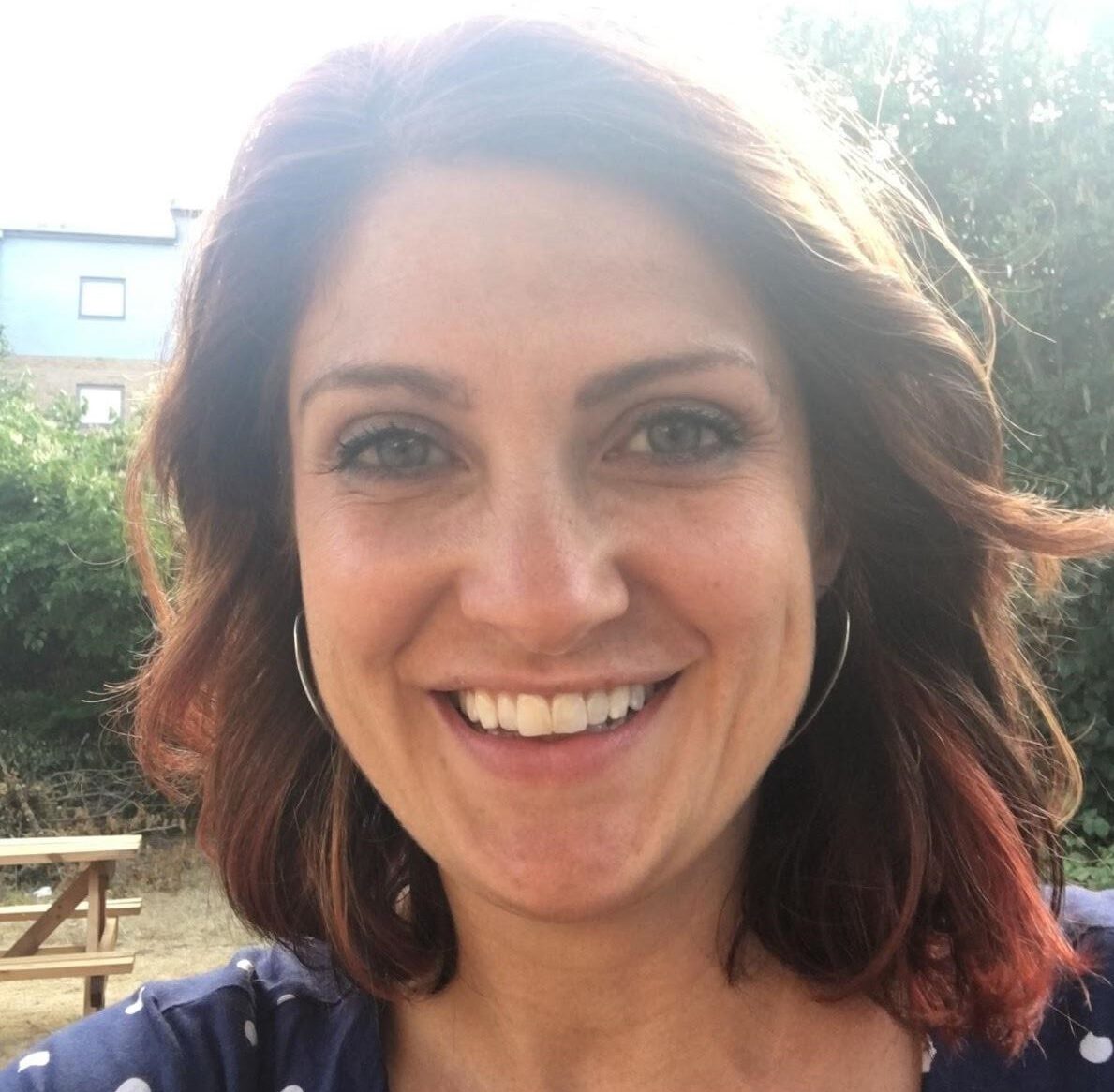
Suzy Horsfall
Suzy has more than ten years of L&D experience at Randstad. She is qualified in coaching, NLP, virtual training design, psychometric assessment, CertRP and CIPD L&D level5. She has designed and facilitated thousands of hours of training and led teams of trainers offering programs including; onboarding, recruitment skills, soft skills, management and leadership development and Challenger sales.
In 2021 Suzy spent seven months in Uganda through VSO, working on a CFYE project with Healthy Entrepreneurs. Currently the global Lead for leadership and management development at Randstad enterprise solutions, Suzy is passionate about learning in all forms, enabling employees to reach their full potential.
Joost van Engen
Rhona Achieng
Episode 3
The case for decent work
“This is the time to leave no one behind because we can’t simply afford it anymore. We need all the talent on the labour market.”
What is decent work? What do young people value in employment? What role does a living income play in making a job decent? In this episode, decent work experts and youth underline what decent and meaningful work means and, more importantly, what the risks are of not prioritizing decent work as an employer. The episode explores some practical steps employers can take to provide young people with decent jobs.
The speakers
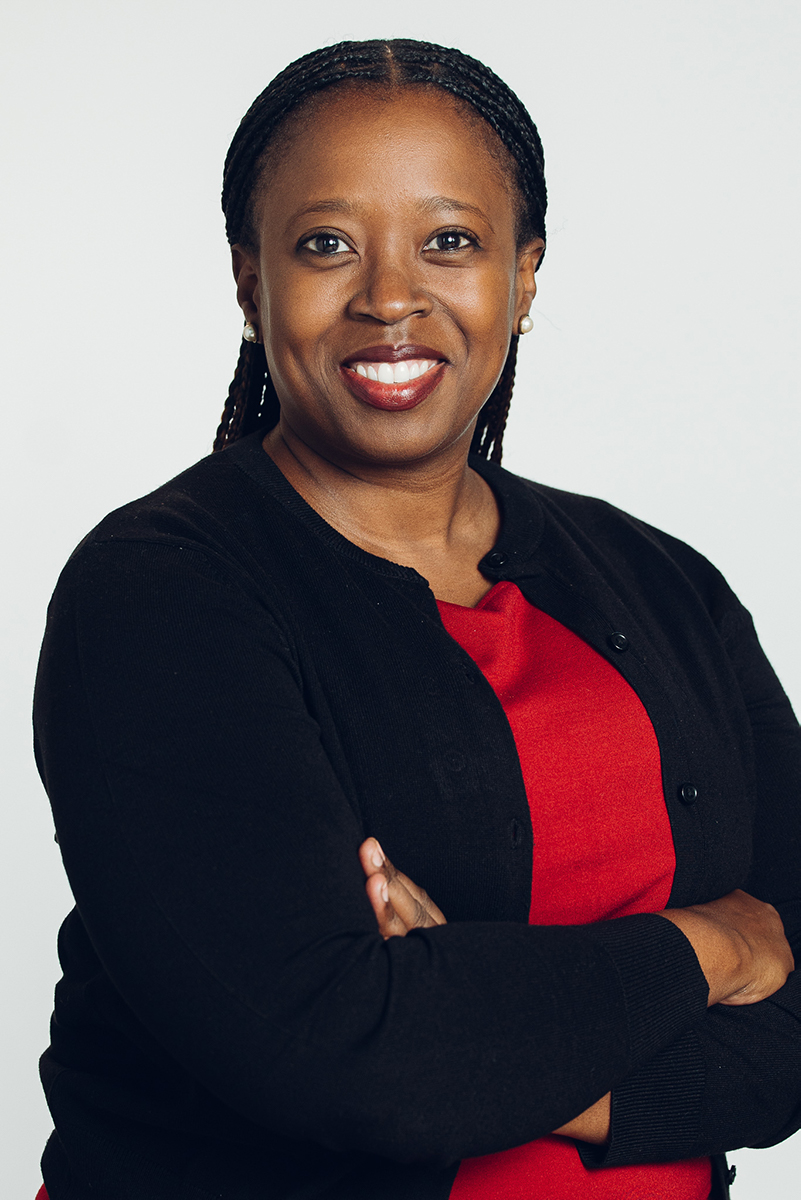 Patience Kikoni
Patience Kikoni
Patience has over 15 years of experience managing economic growth and social investment programmes across Africa. She is currently the Country Lead for the Challenge Fund for Youth Employment in Uganda, overseeing the portfolio and project delivery in the country. Patience previously worked as a Senior Technical Advisor for the UK-funded NU-TEC Market System Development Program, which aimed at supporting agribusinesses in Northern Uganda to increase investment and job creation. Her other focus areas have been supporting small and growing businesses in East Africa to transition to more entrepreneurial and investment-ready models.
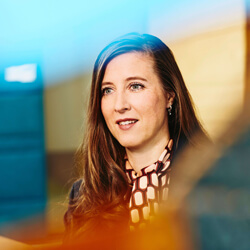 Sonja van Lieshout
Sonja van Lieshout
As head of global public affairs at Randstad, Sonja is responsible for global public affairs with a focus on developing the global strategic public affairs agenda, including advocacy, strategic stakeholder engagement, and thought leadership. Her network consists of, amongst others, the ILO, IOE, OECD, European Institutions, business networks, think tanks, academia, and social partners such as central employers organizations and Trade Unions in the ecosystem of the world of work. As a member of the global board of the World Employment Confederation and the Executive Committee, her main drive is strategically contributing to the development of the employment & recruitment industry on both global and European levels. Next to this, she chairs the European Sectoral Social Dialogue Committee on behalf of the employers. In her private life, she is a member of the Executive Board of the UP Foundation, an organization focussing on the well-being of parents of special needs children, ensuring these parents are provided with relaxing and inspiring moments, not thinking of their care-taking responsibilities in order to return fully recharged to their families.
Episode 2
For youth, by youth, with youth
“For youth, by youth, with youth means not only inviting youth to the table but allowing them to have active participation at the table.”
Engaging youth is indispensable for creating meaningful jobs for young people; it also adds significant business value, creating a competitive advantage for businesses. In this episode, we uncover how youth participation makes a win-win scenario for young people and private entities and how we can authentically engage with youth to avoid tokenism.
The speakers
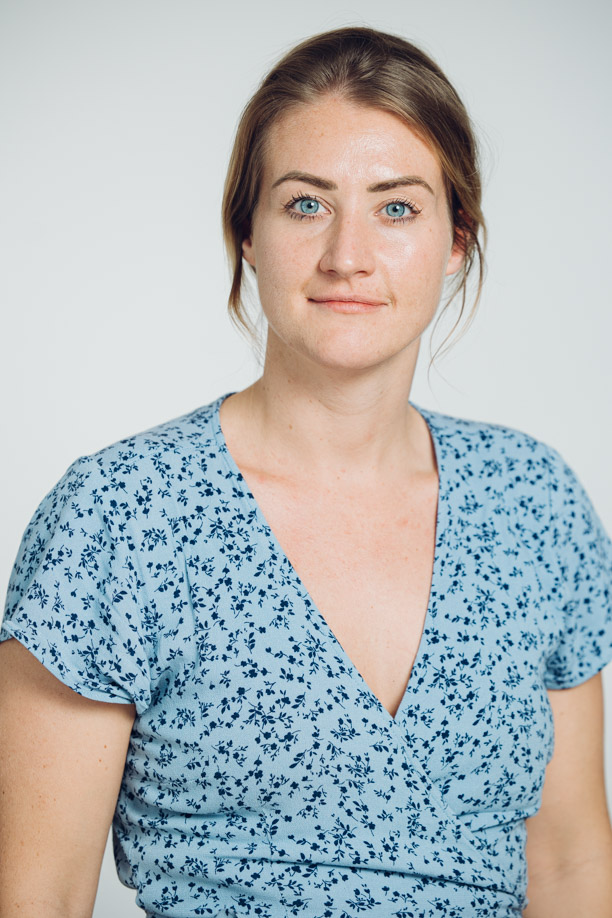 Essene Tighe
Essene Tighe
Having started as a youth volunteer on an overseas development programme in India, Shiny now has almost ten years of experience in working with youth, with a focus on the practice of meaningful youth engagement. She is passionate about working with committees of young people to co-design and set up large global youth networks, tackling issues that affect young people. Having worked for both the private and public sectors, Essene (Shiny) has developed effective and innovative strategies, methods, and tools to support and advise young people and organizations to understand and embed meaningful youth engagement in the context of their organisation, programme, and project. Since meaningful youth engagement is a term that is still relatively new to a lot of organisations, Shiny has developed human-centered design techniques to ensure youth and organisations are at the centre of designing meaningful youth engagement practices.
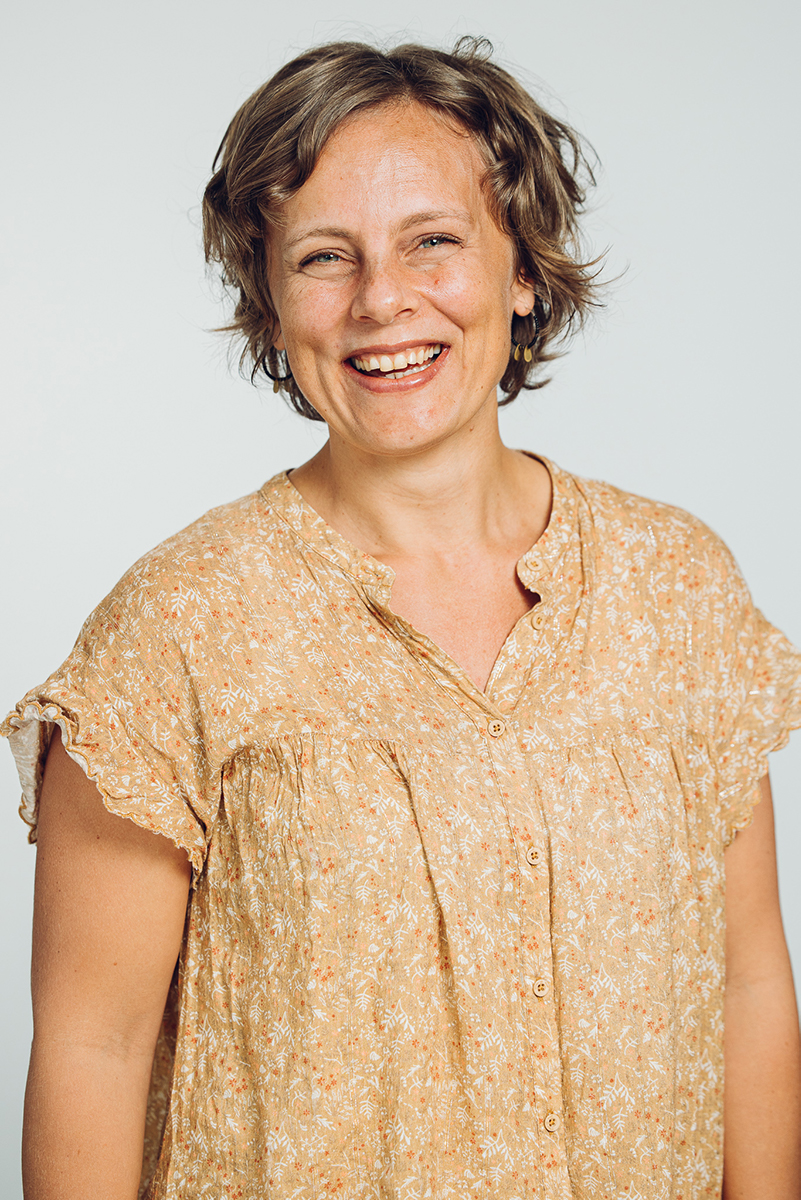 Lisette Westerhuis
Lisette Westerhuis
Lisette is a social investment strategist and owner of an impact consultancy firm.
In her early twenties, she left for Tanzania, where her passion for combining impact and business was born, and she turned a leading social business around to profitability within the first year. Now, she works on solving some of the most pressing challenges and finding high-impact solutions for and with diverse teams at leading impact investors and social investment funds across emerging markets. Lisette is a true believer in the business value of investing in impact and the competitive advantage a young and inclusive workforce can create.
Episode 1
Youth unemployment and the future of jobs
“Young people are becoming more assertive and speaking up. This encourages private organizations to listen to them and take them seriously.”
Youth unemployment is growing in Africa. Every year, around 12 million young people enter the labour market, while only 3 million jobs are created. The magnitude of the problem means new innovative approaches become necessary to tackle this issue. This episode outlines how the employment market looks in Kenya and Nigeria, what opportunities the economies create, and how youth’s potential can be a driving force in finding solutions.
The speakers
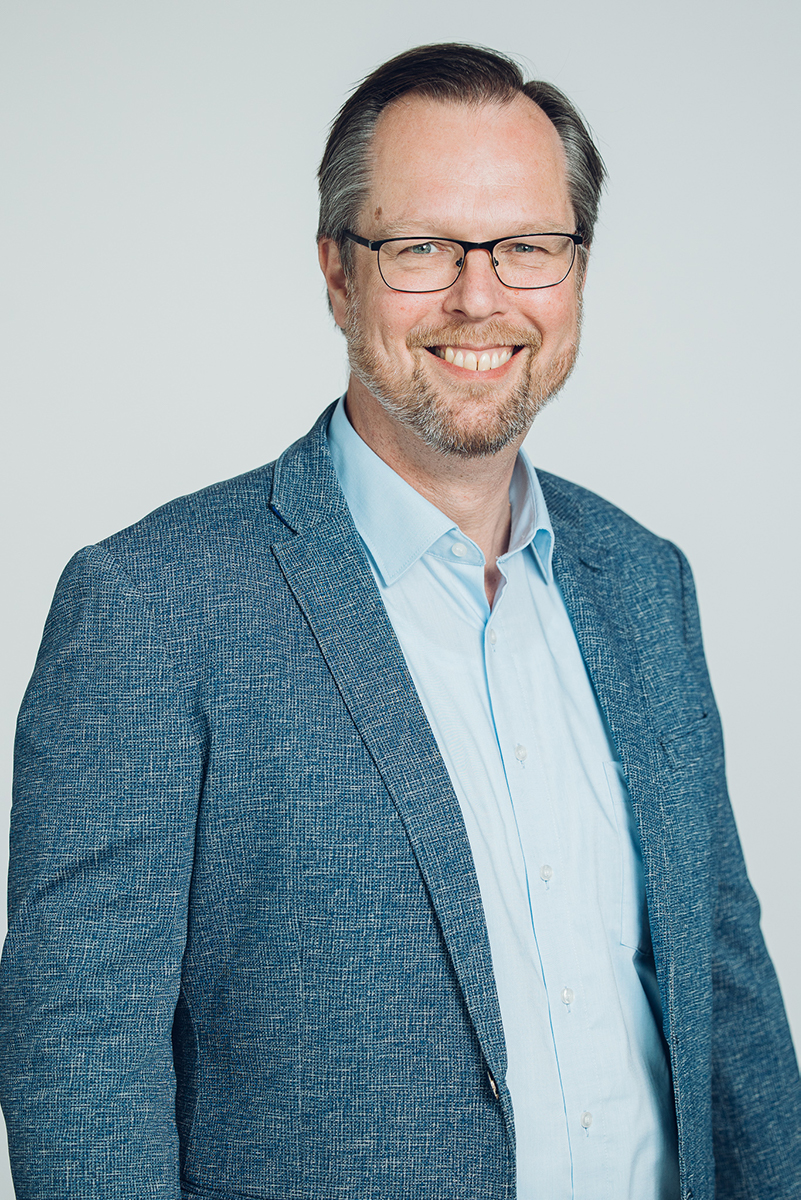 Joost Verwilghen
Joost Verwilghen
Joost has been working in international development for over 25 years, mainly managing and supporting private development initiatives to promote economic growth and reduce poverty. Over the years, he has worked directly with private sector companies as well as on Market Systems Development programs for a range of funders and clients. Currently, Joost is the Team Leader of the Challenge Fund for Youth Employment, a fund supported by the Netherlands Ministry of Foreign Affairs.
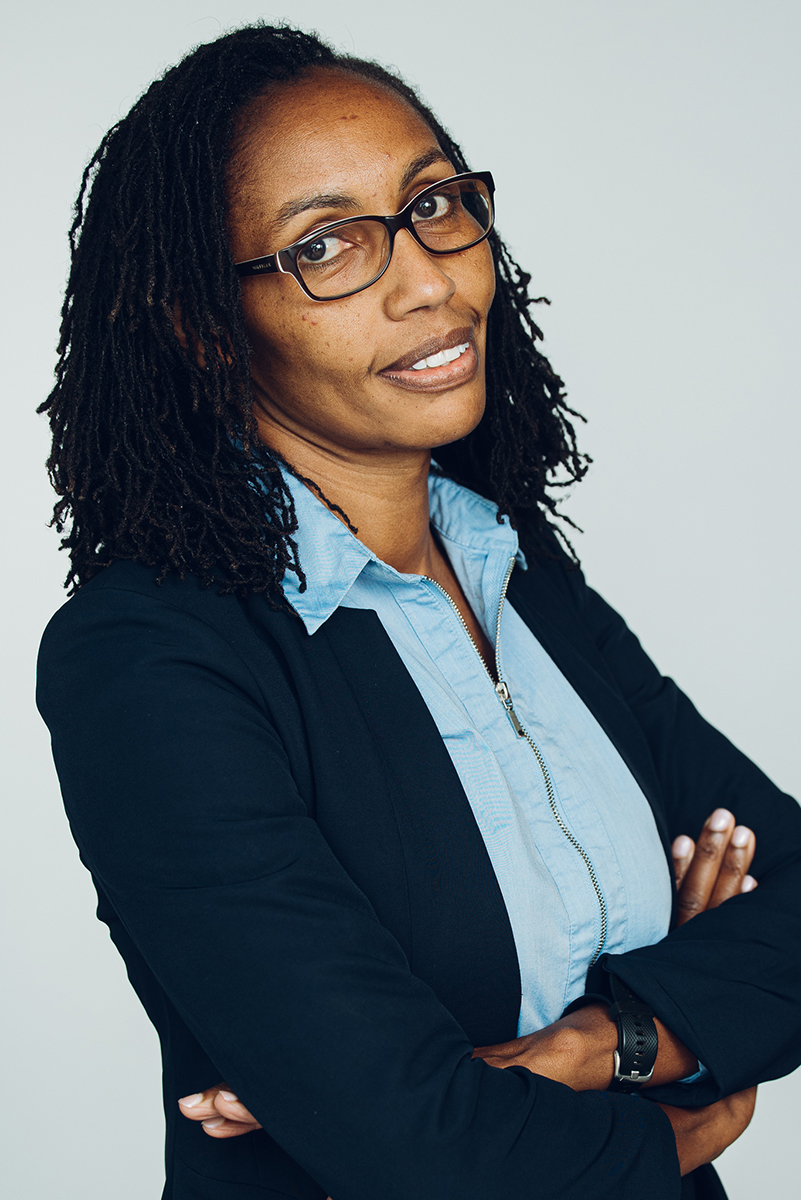 Beatrice Gichohi
Beatrice Gichohi
Beatrice is a business development professional with more than 15 years of experience in supporting organizations to develop agile solutions in HR, Financial Management, Marketing, access to finance and markets, as well as overall entrepreneurship. She has supported youth employment initiatives in the past through skills development, mentorship, and business development support for youth-led SMEs. She holds an MBA in strategic management and Human Resource management.
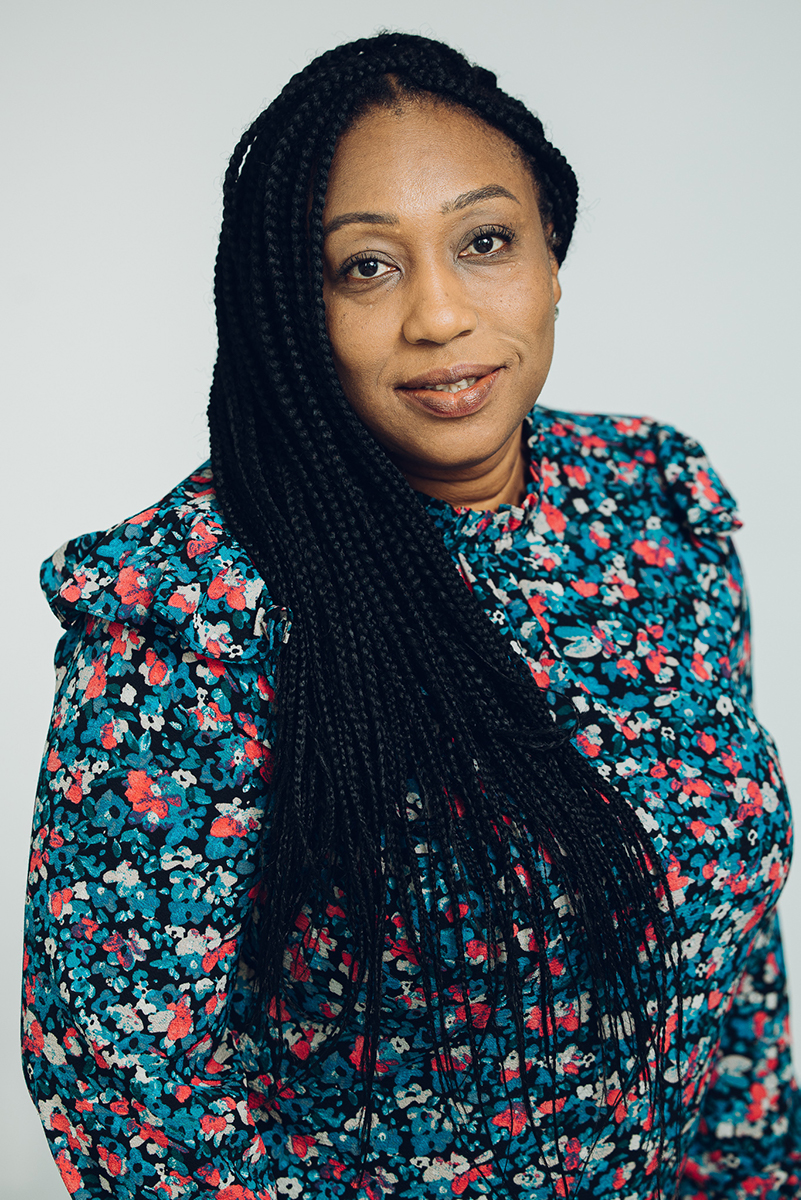 Nneka Enwonwu
Nneka Enwonwu
Nneka is a private sector development consultant with over 21 years of experience delivering high-quality services to clients in the private and public sectors and donor agencies, including the FCDO (Foreign, Commonwealth & Development Office), Dutch Ministry of Foreign Affairs, World Bank, and the International Finance Corporation. She has worked in sectors such as healthcare, agriculture/agro-processing, oil and gas, education, and financial services and has supported employment creation initiatives in those sectors. For the last two years, Nneka has worked on a large youth employment programme and provides technical support to various organisations implementing youth employment projects in Nigeria.
Meet the host
Kevin Eustatia
Youth Policy Advisor, Kevin Eustatia, invites different guests to discuss the most pressing issues in youth employment.
Kevin is a Youth Engagement Expert and consultant. He has spent years working in and with governments, NGOs, and companies to promote and implement meaningful youth participation (MYP) within their policies and strategies. He is currently a member of the Youth Advisory Committee of the Dutch Ministry of Foreign Affairs, where he advises the Ministry on their foreign policy relating to development cooperation from a youth perspective. He was born and raised in Curaçao, where he experienced first-hand how detrimental the systemic lack of youth engagement can be. He has been fighting for meaningful youth participation ever since.
About this podcast
Future Economies Start with Youth
Youth employment conversations are multi-faceted and complex. That is why, we have created a new space to explore the richness of these topics: our Future Economies Start with Youth podcast.
Through this initiative, we aim to highlight youth perspectives and dive deep into the structural roadblocks in youth employment. What are the challenges youth face when looking for a job? What are their personal stories? How can companies work with youth to navigate employment barriers?
Future Economies Start with Youth will unite experts and young people and encourage them to establish joint visions for a future of decent employment for youth.
In each episode, Youth Policy Advisor, Kevin Eustatia, invites different guests to discuss the most pressing issues in youth employment. Watch episodes on decent work, inclusion, gender equality, youth engagement, and much more below!
You can listen to Future Economies Start with Youth on:
